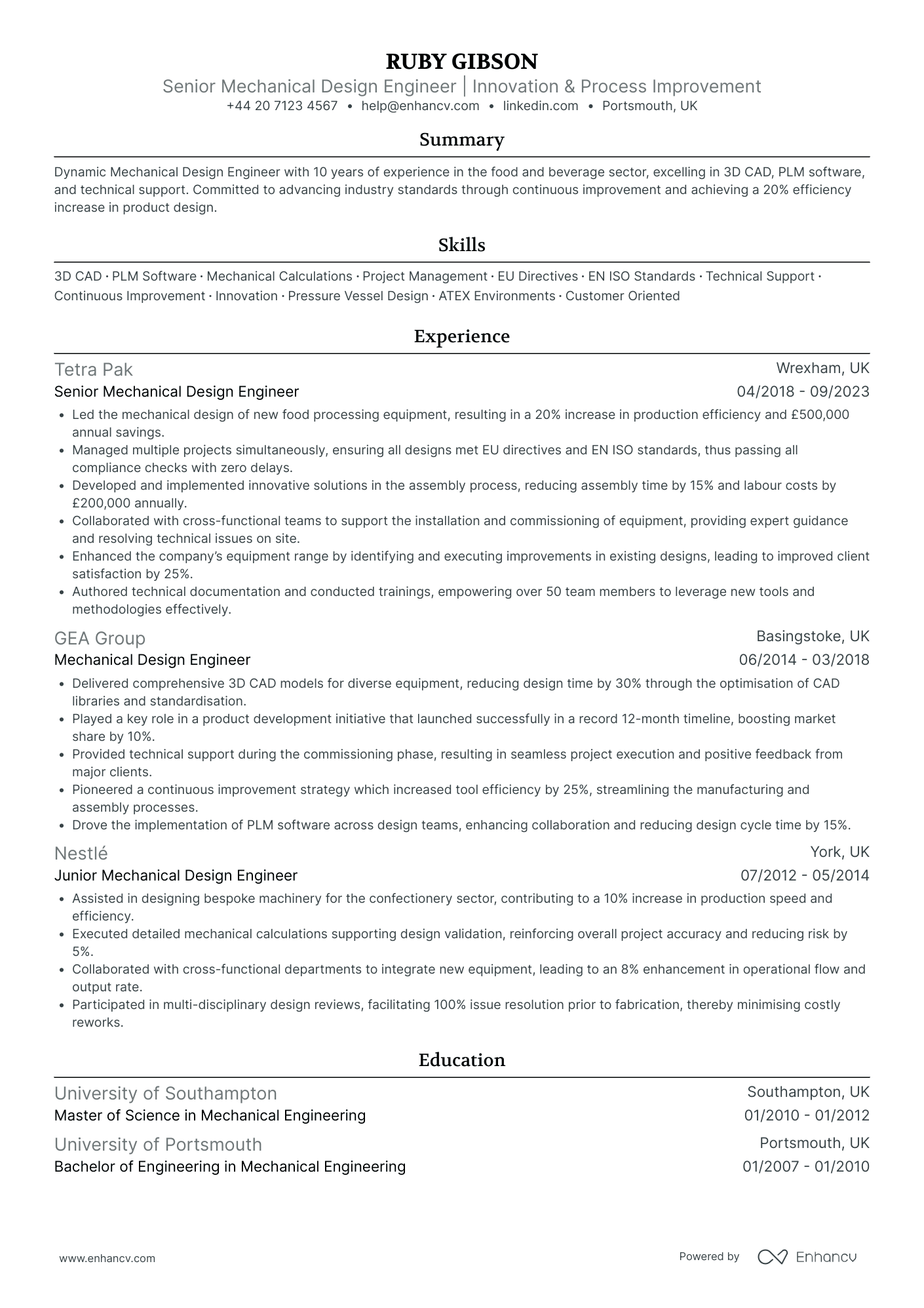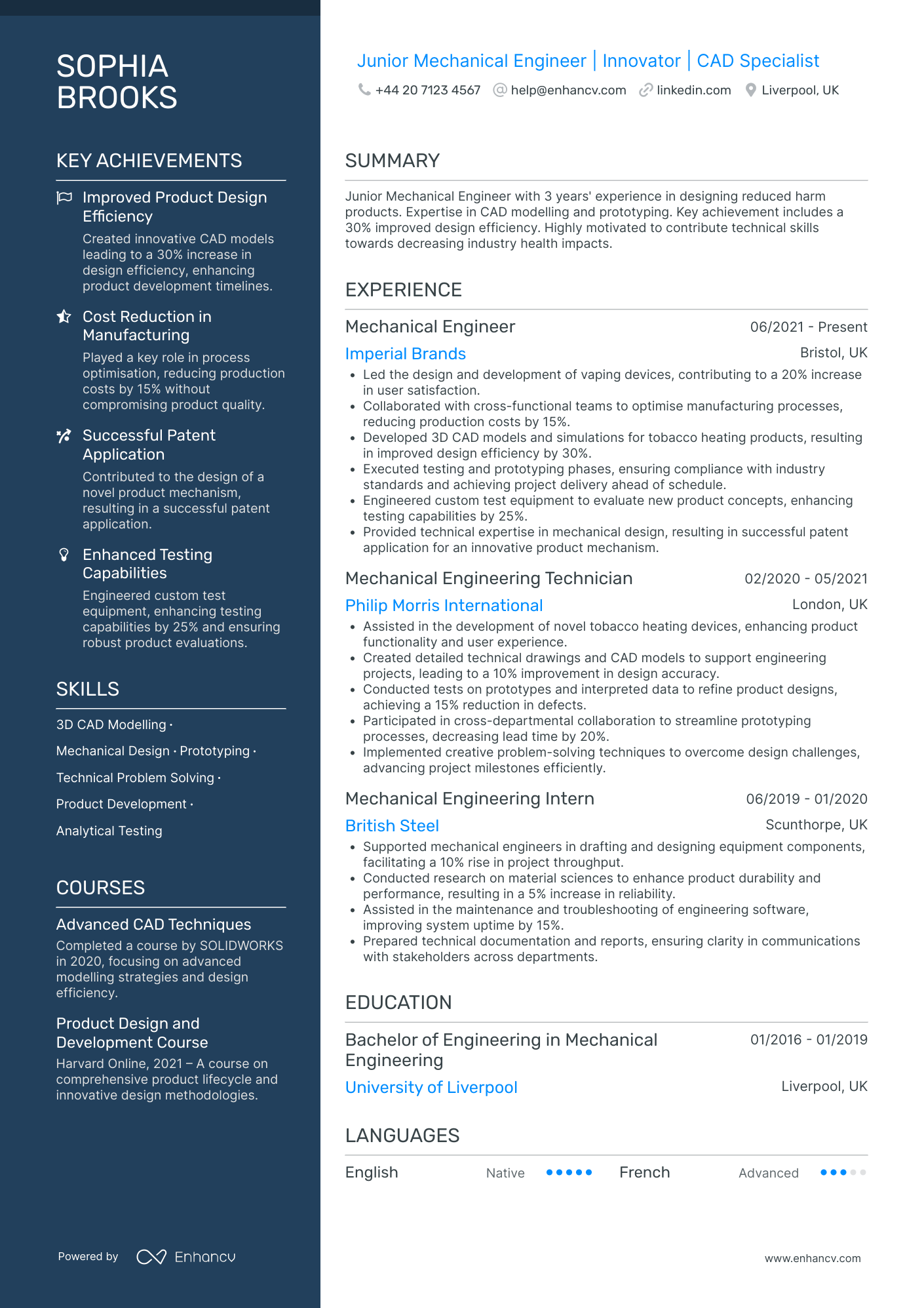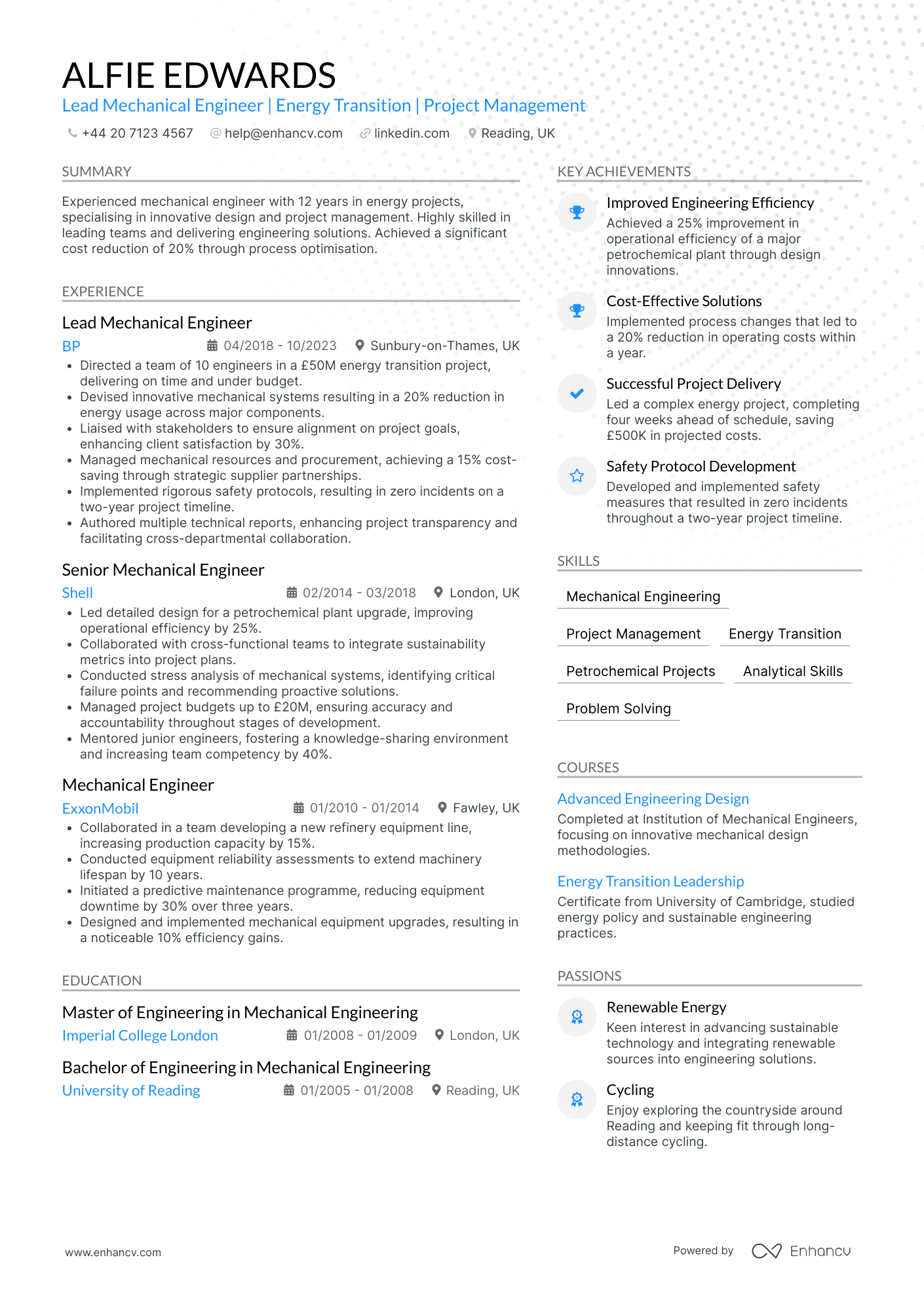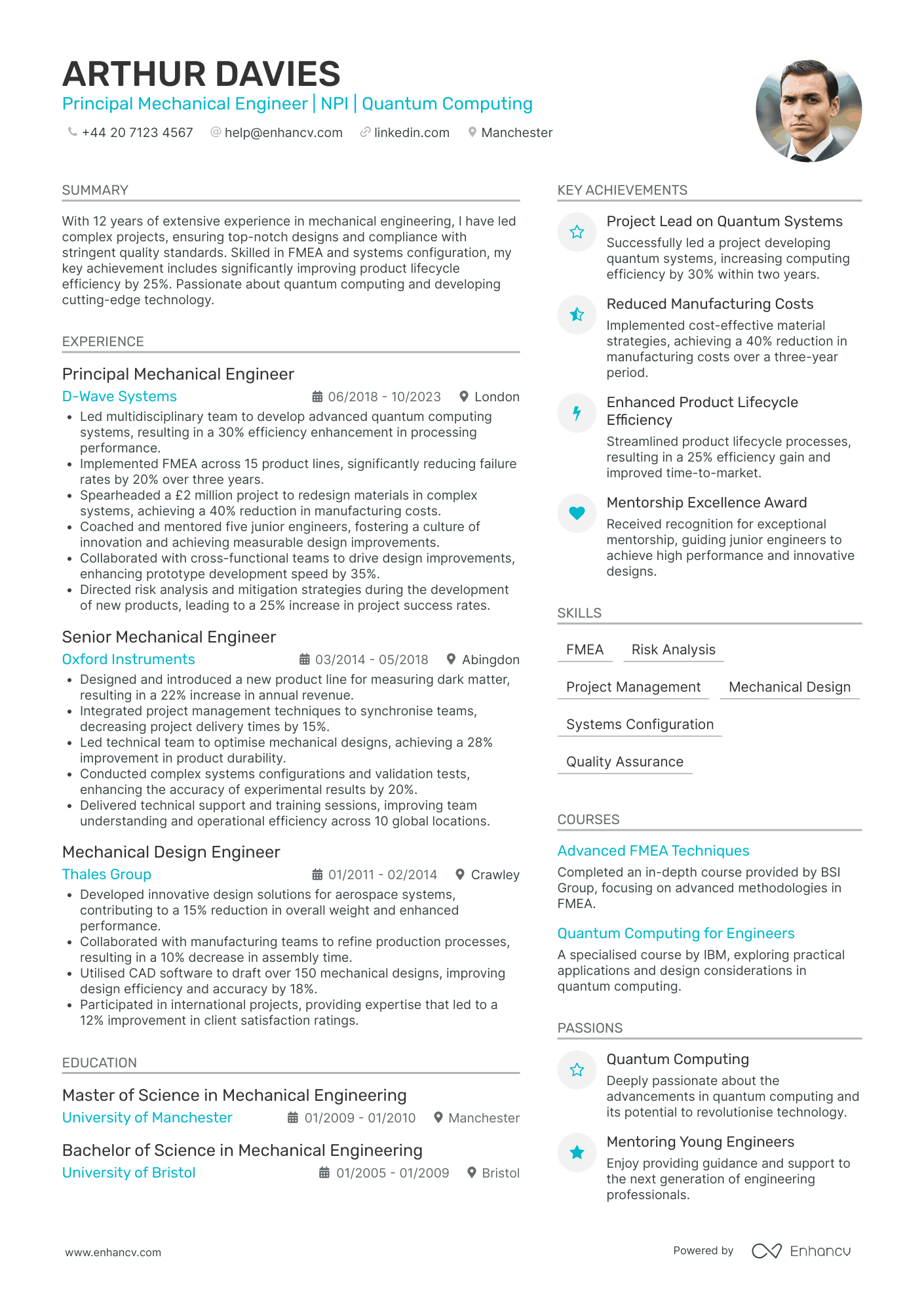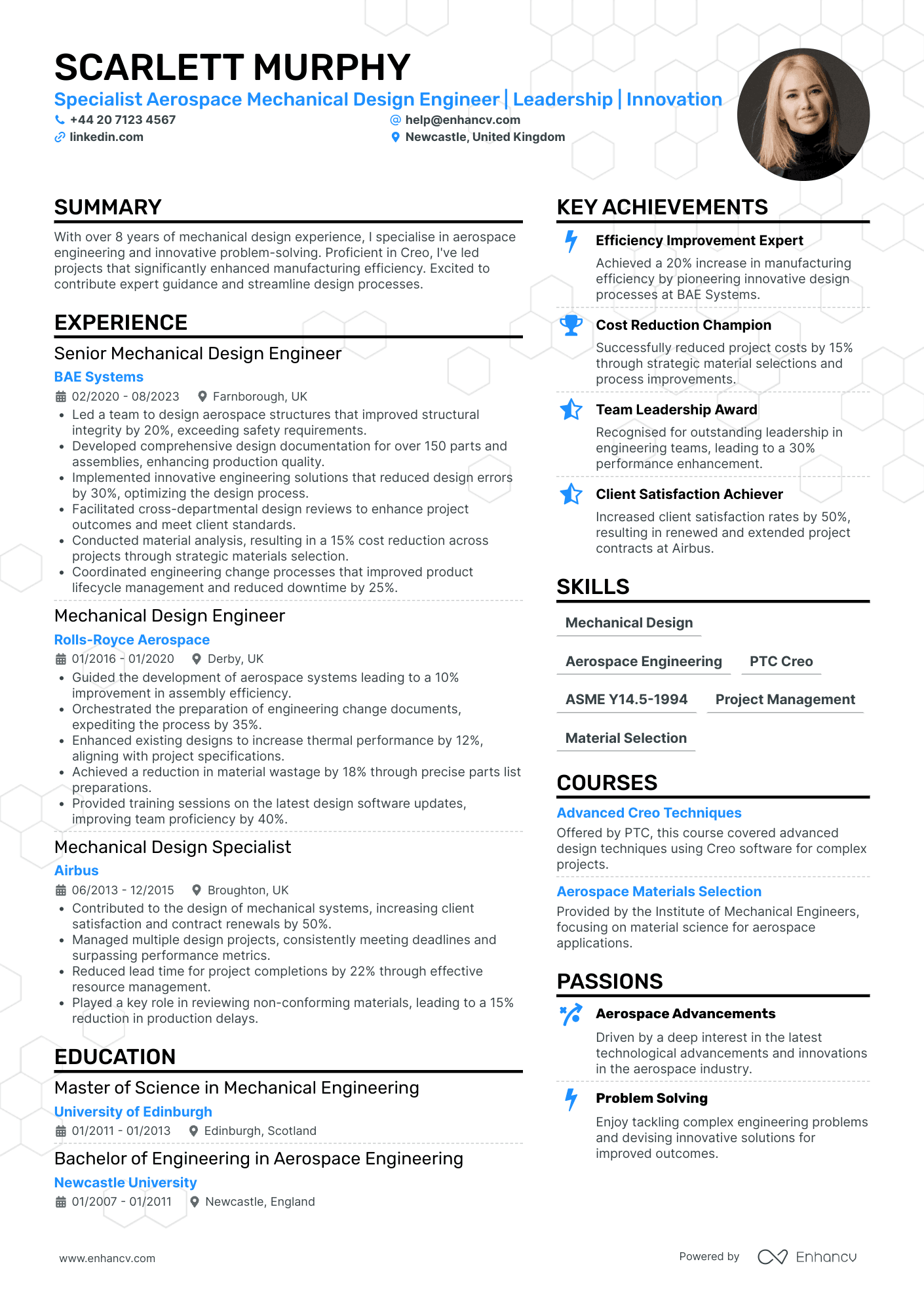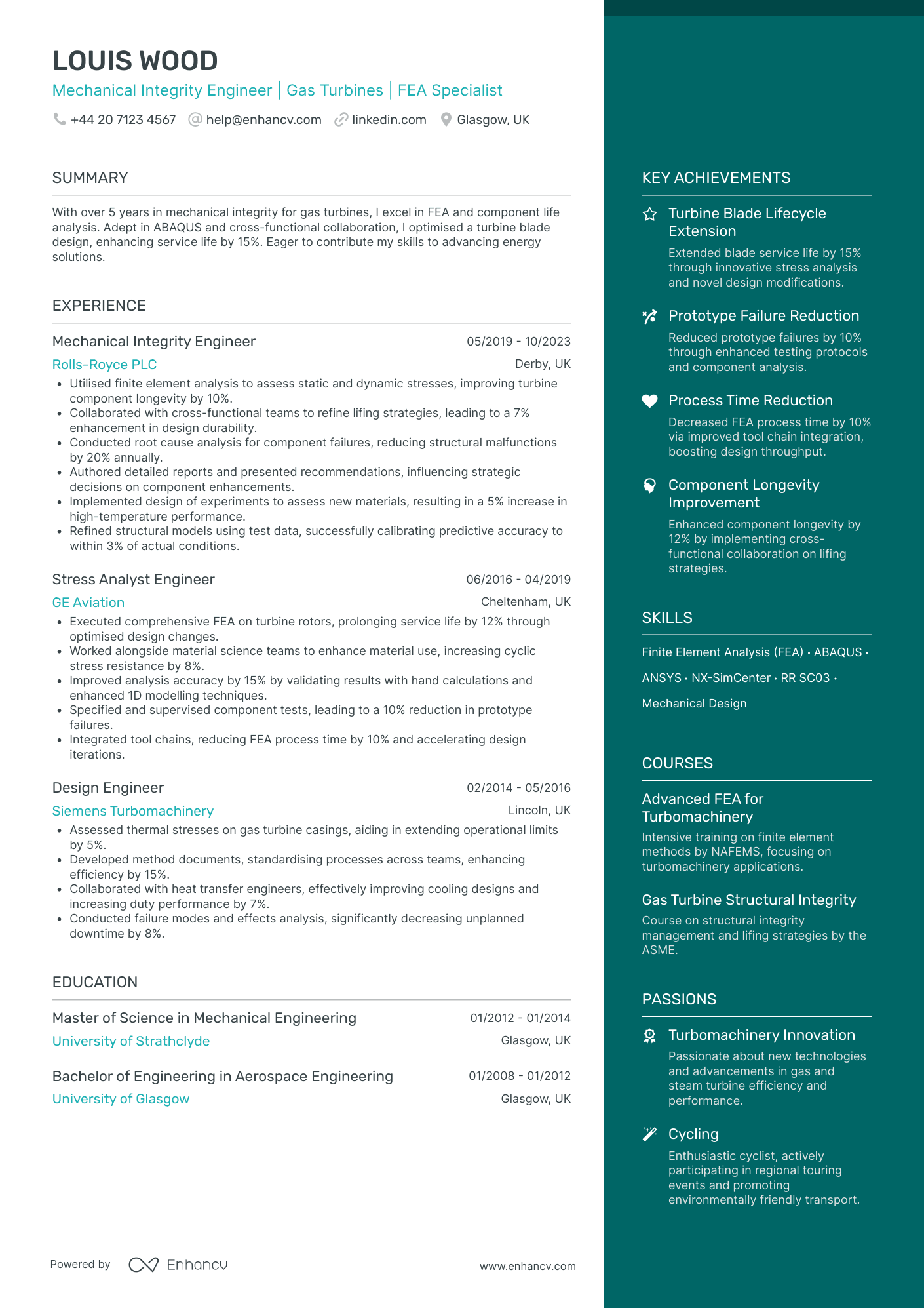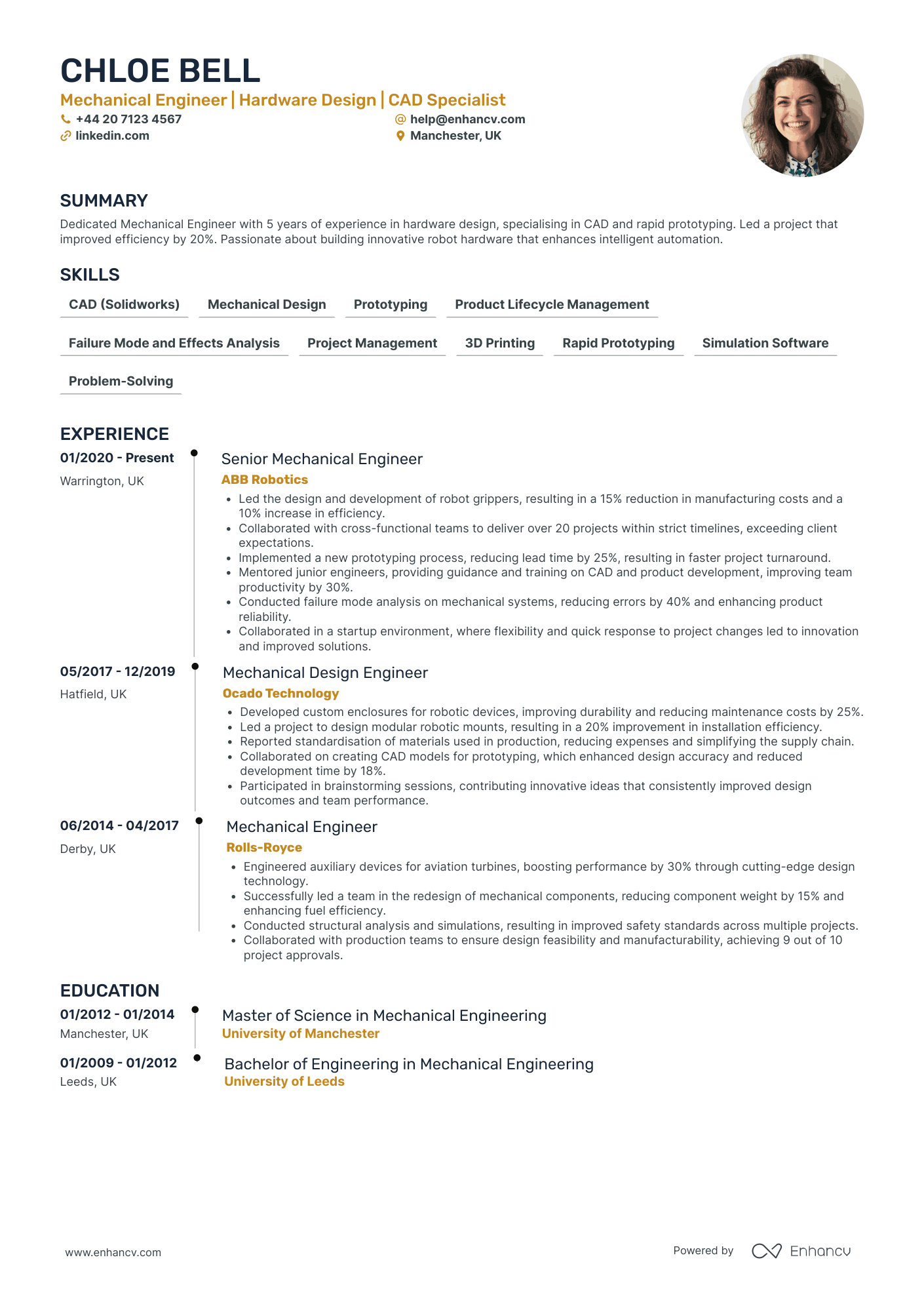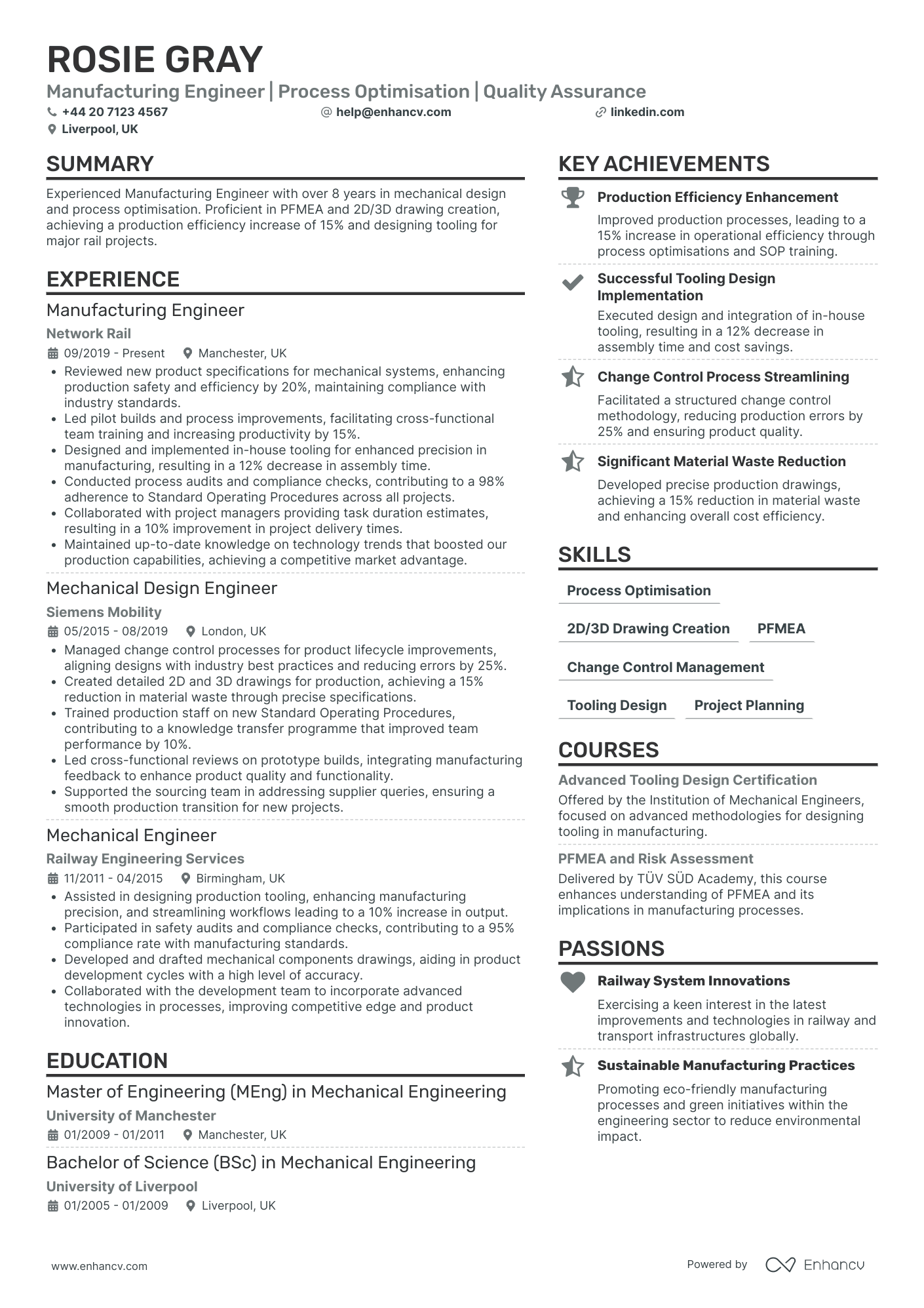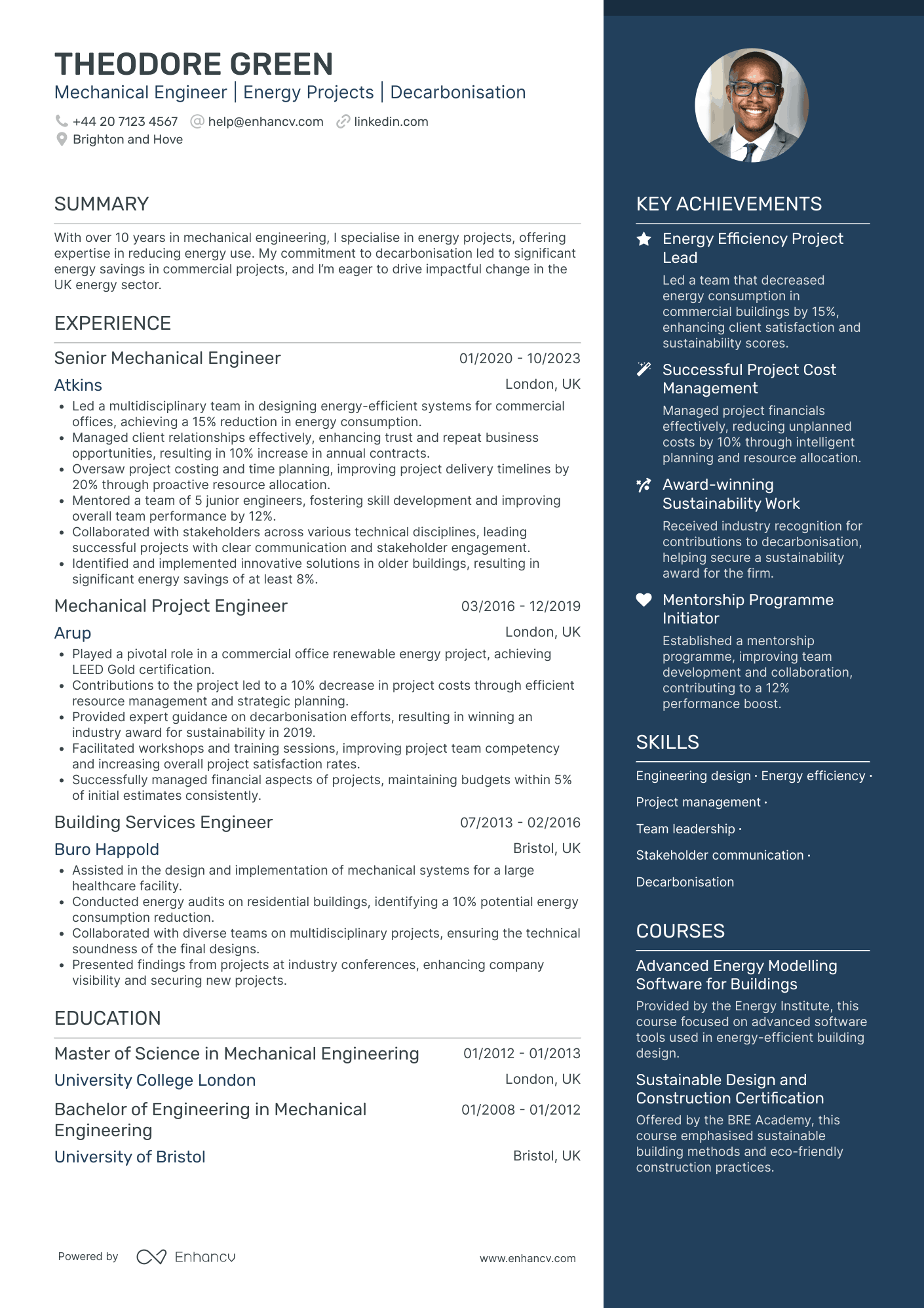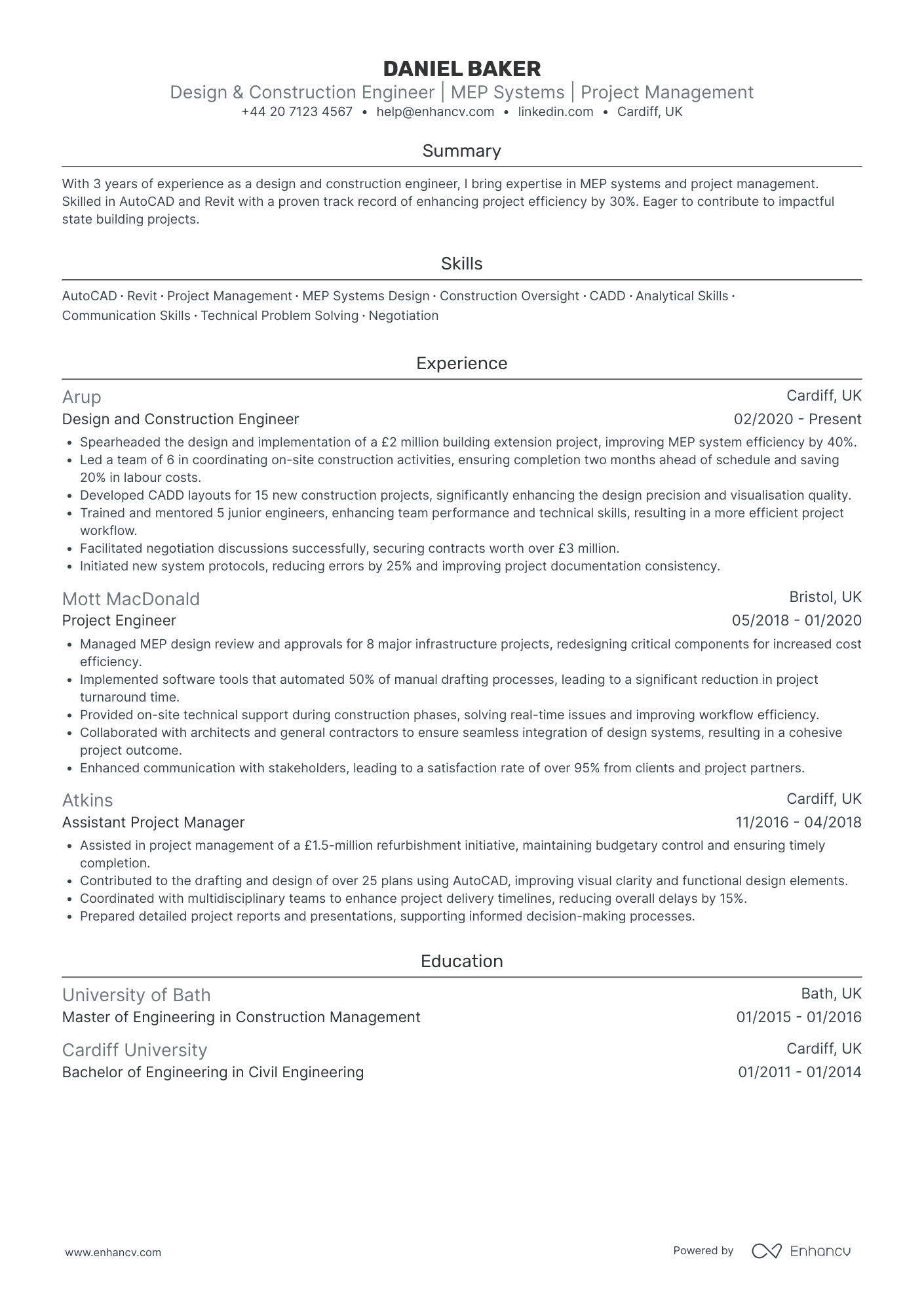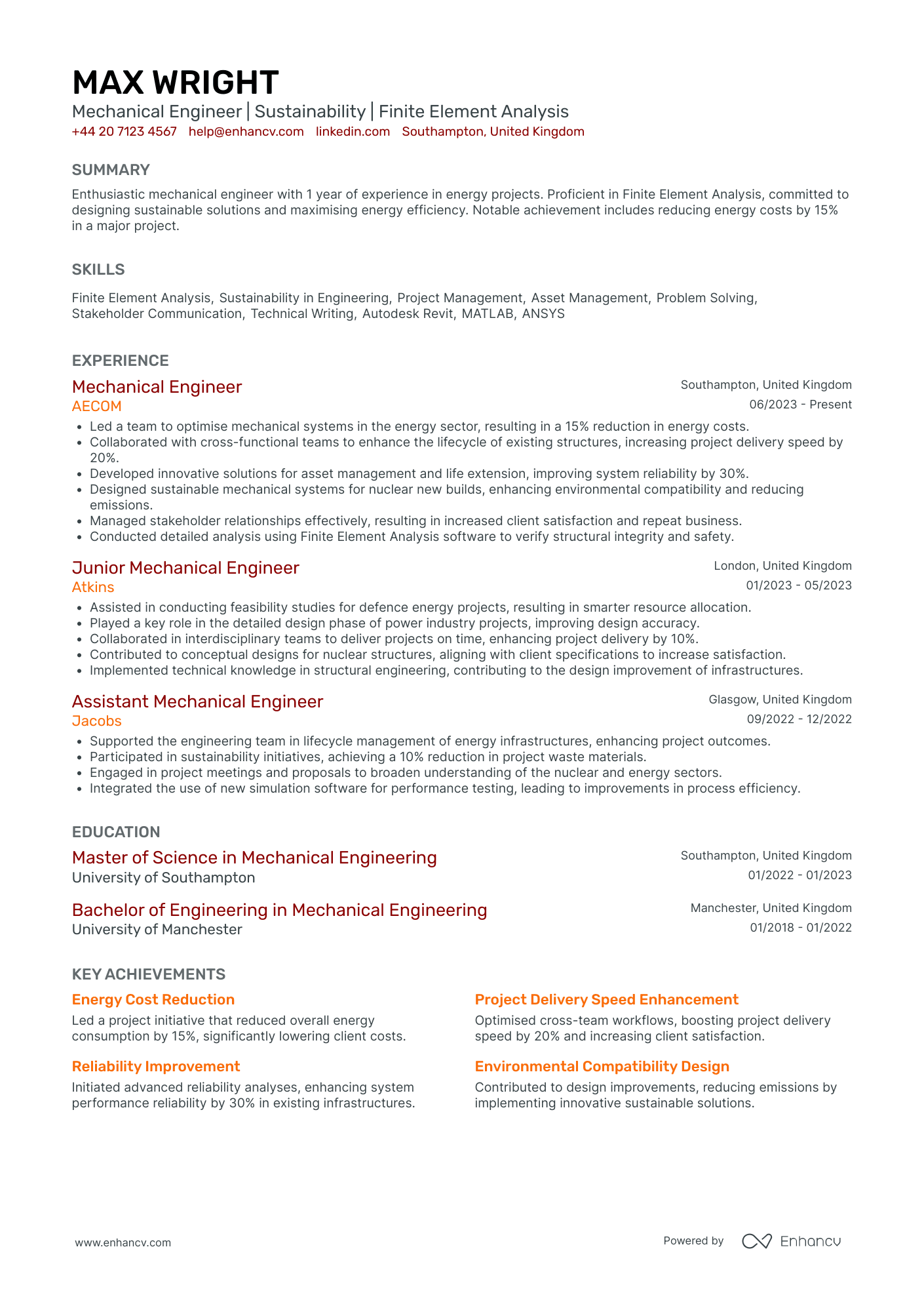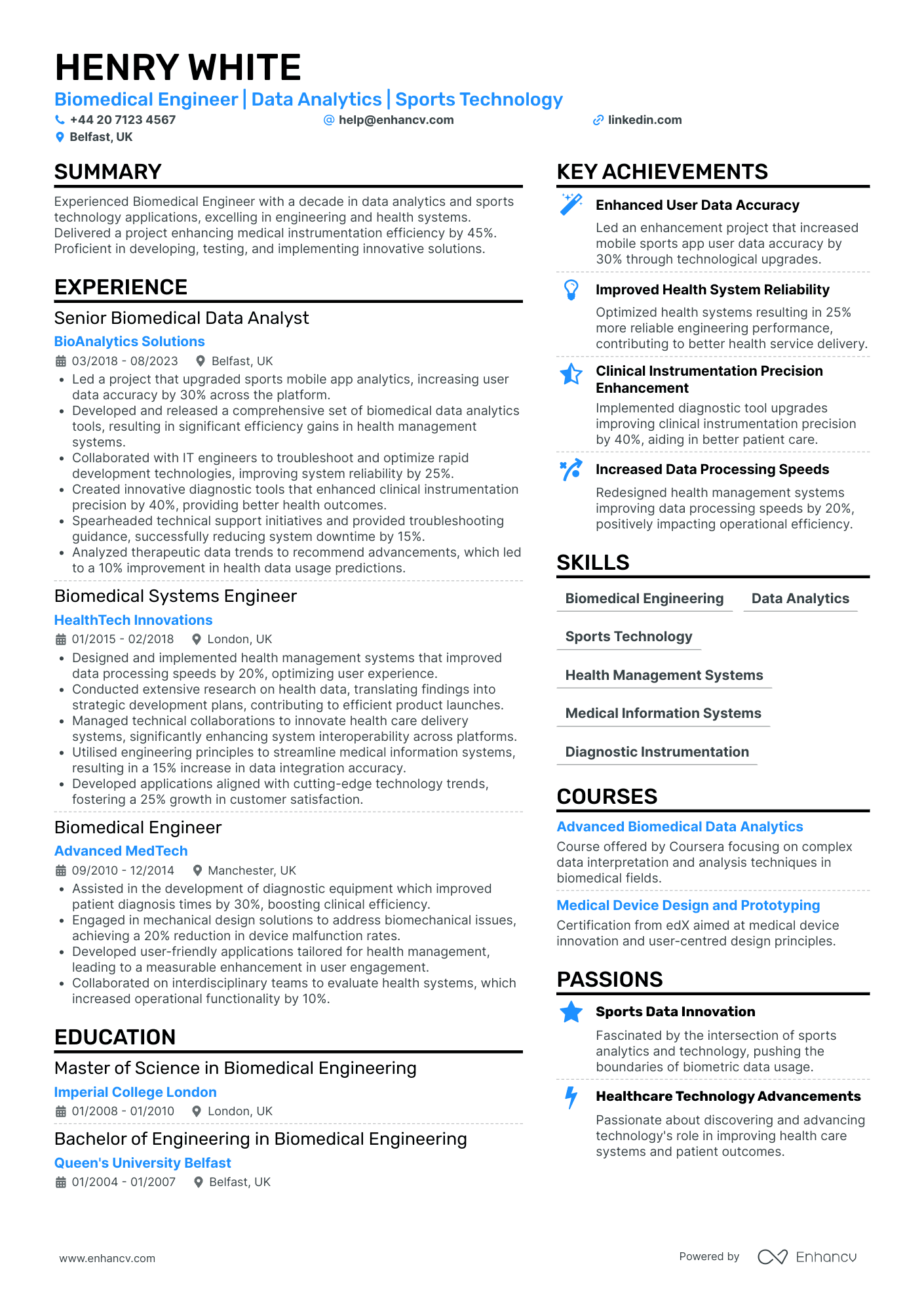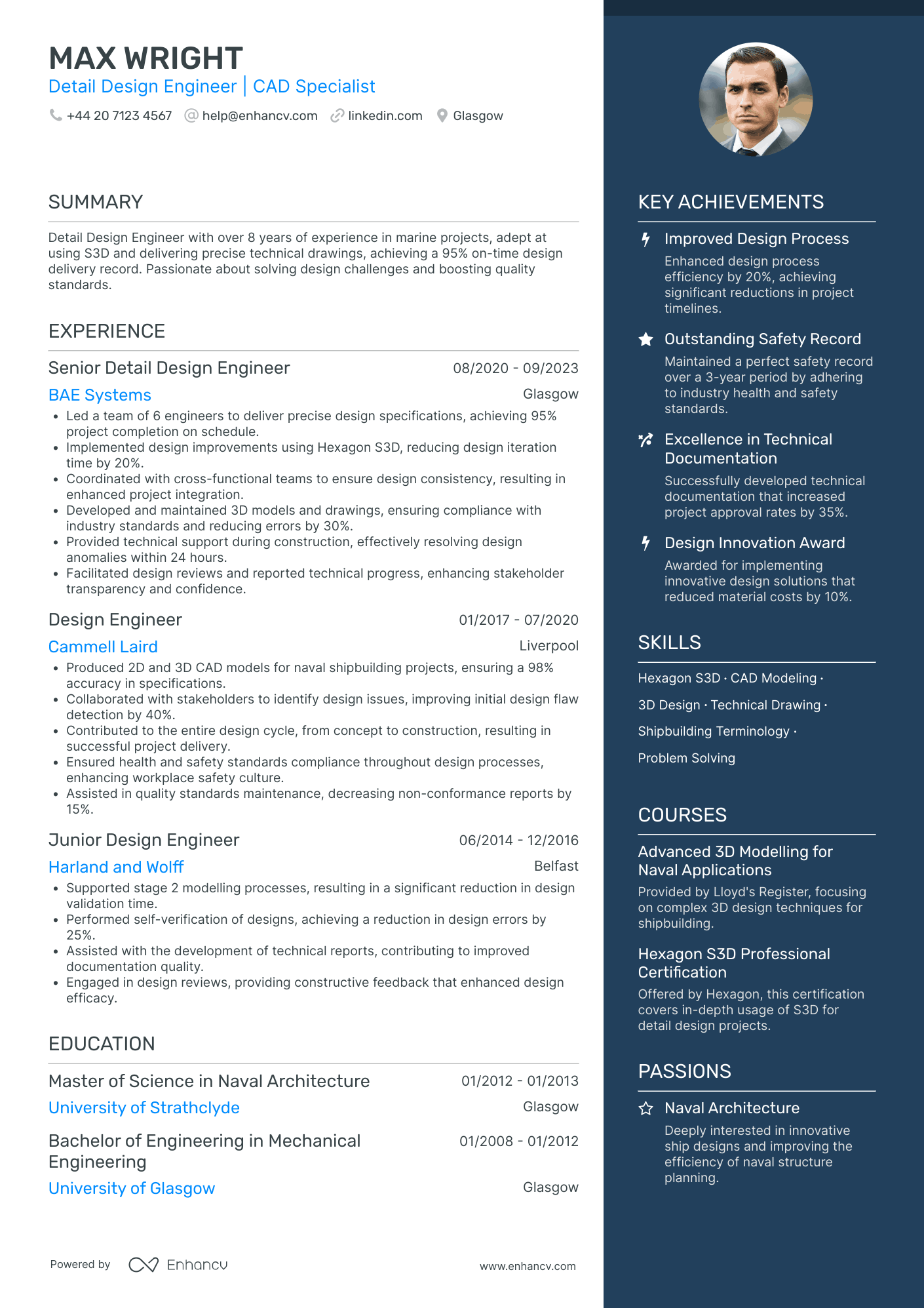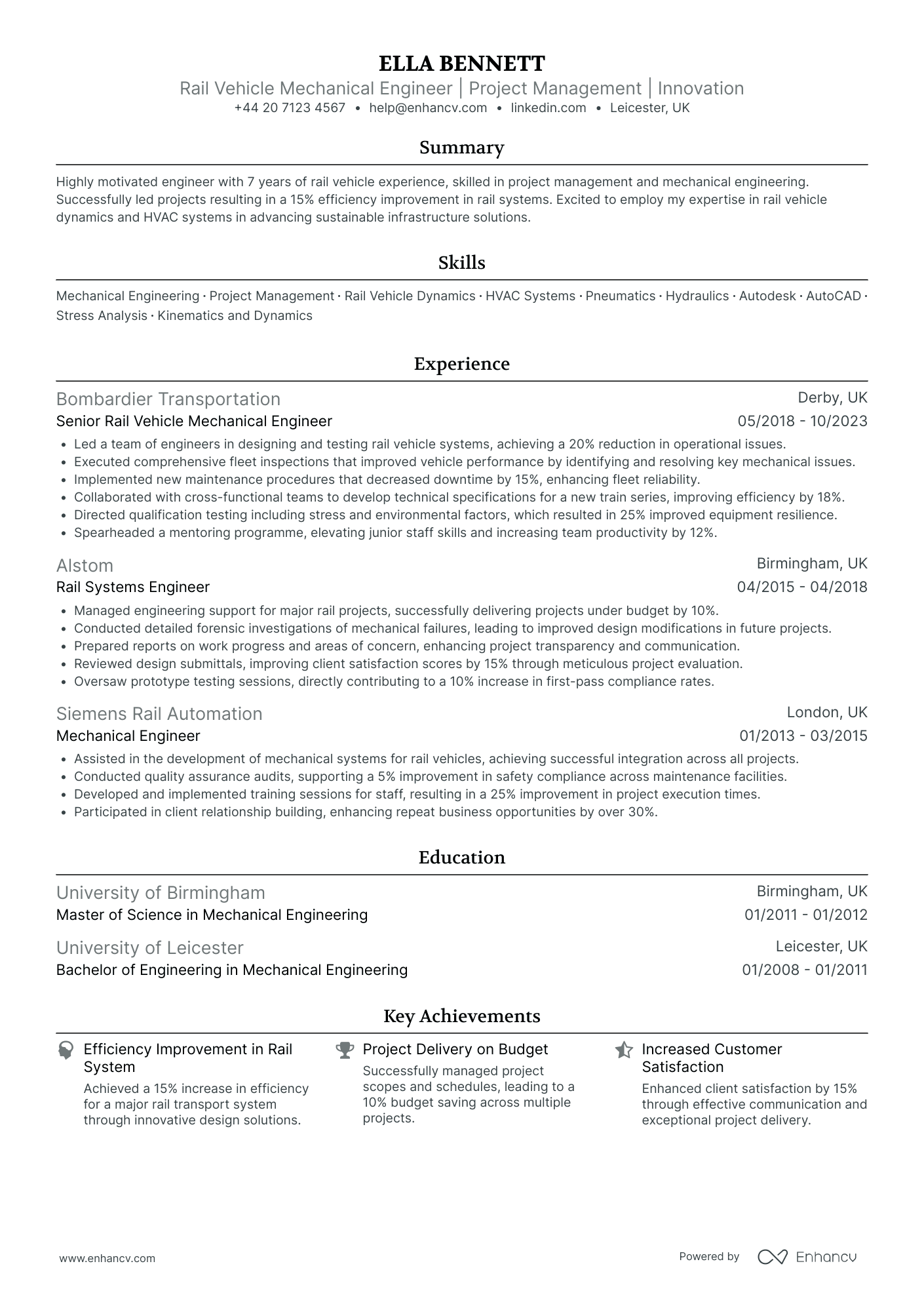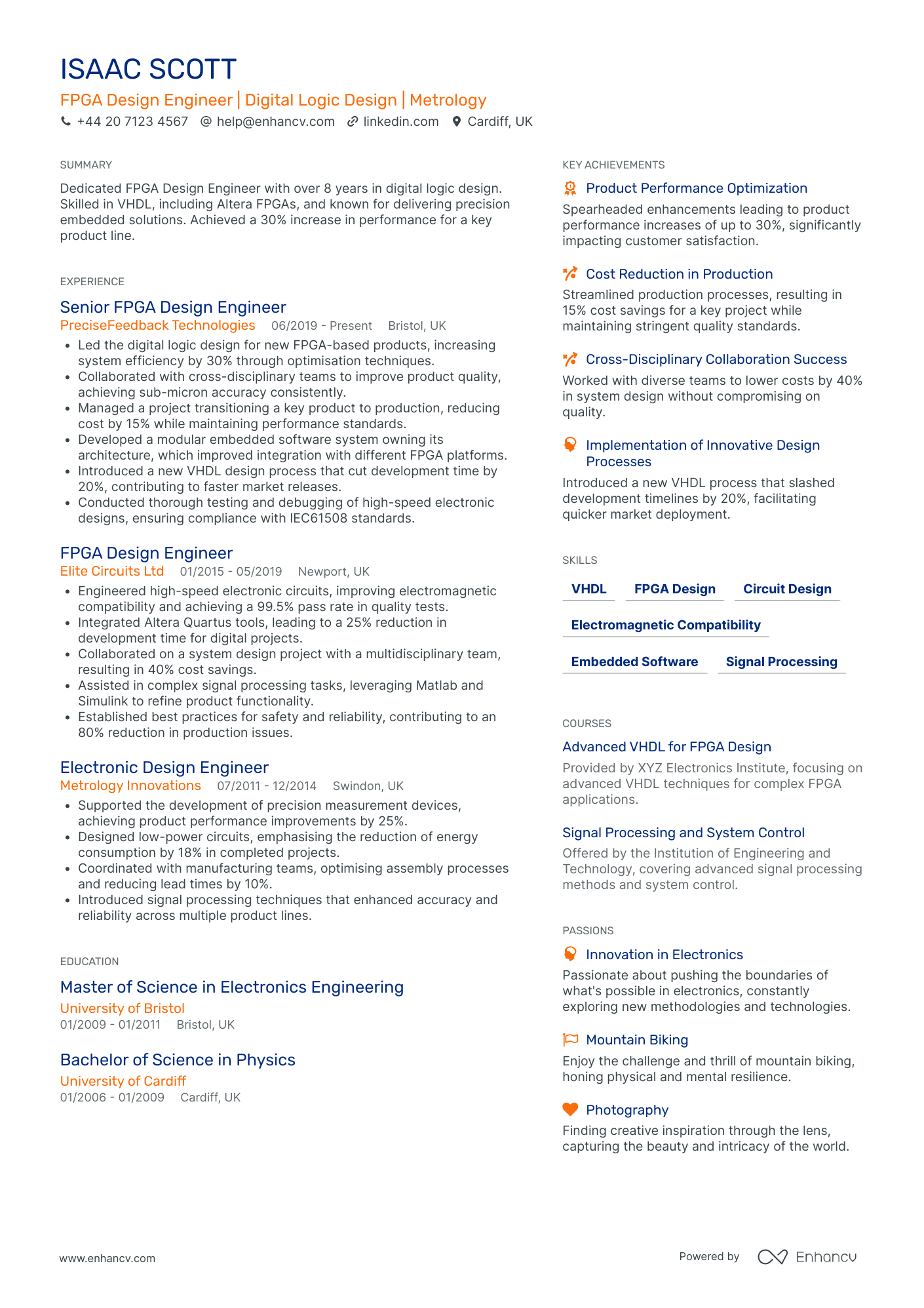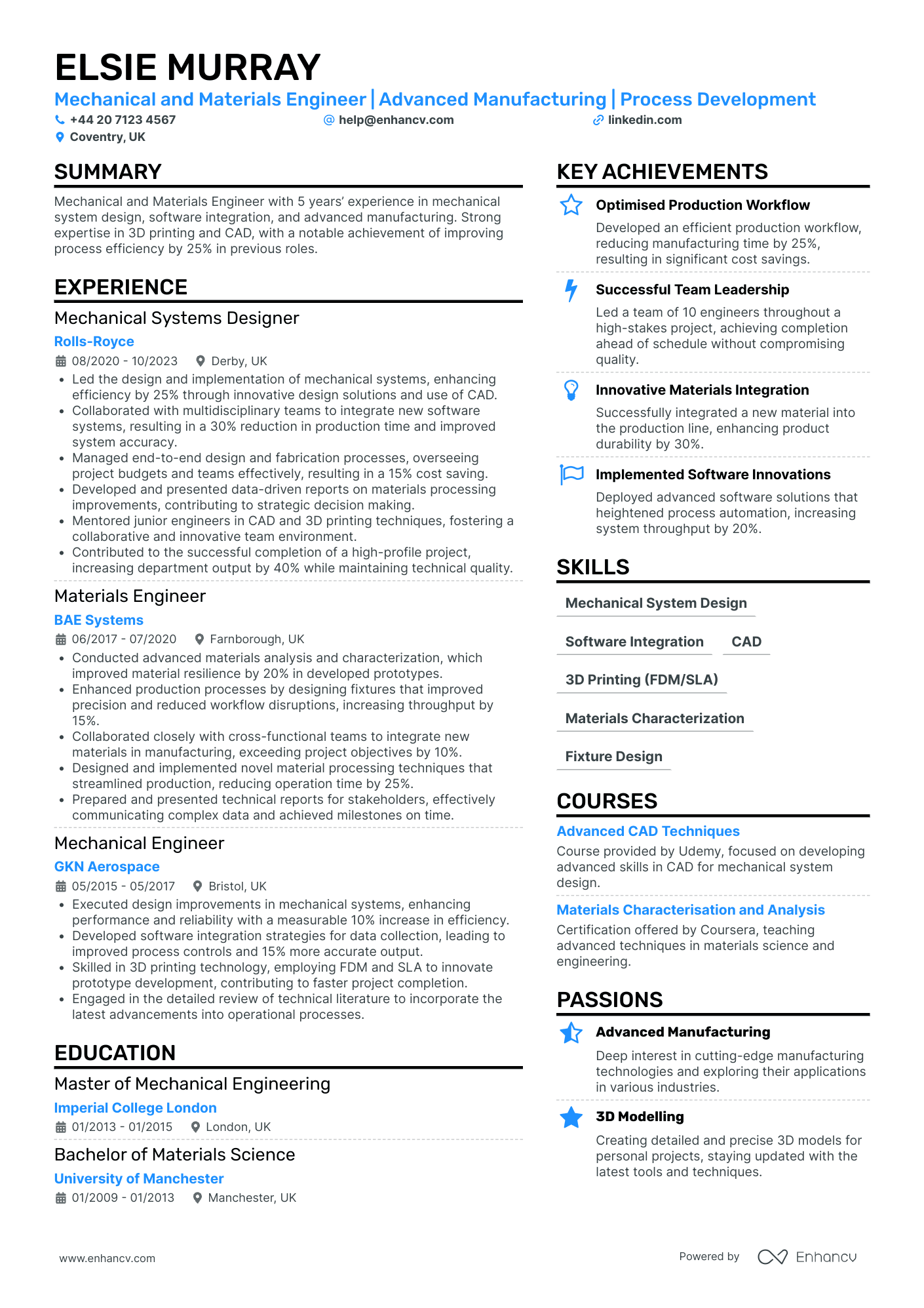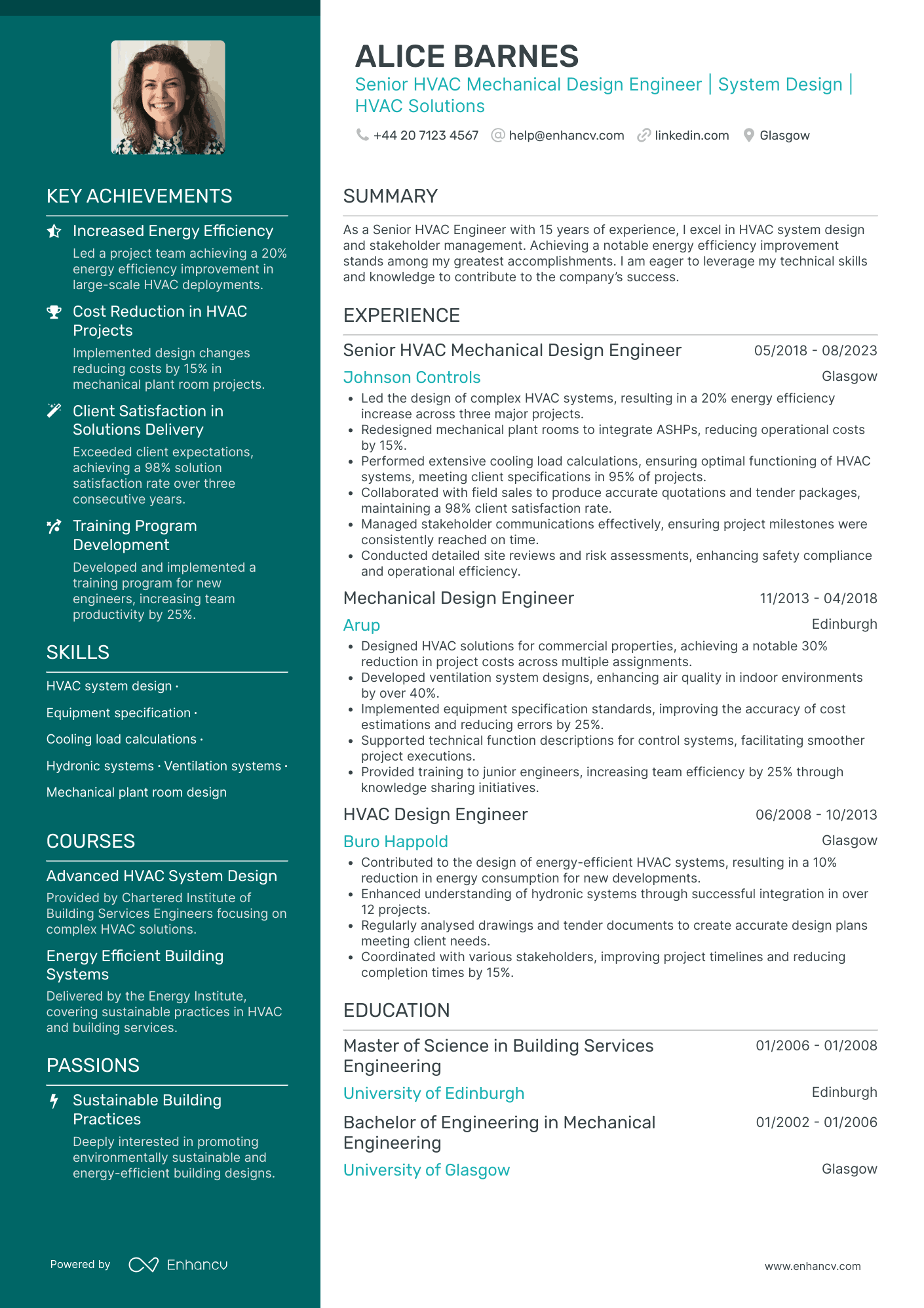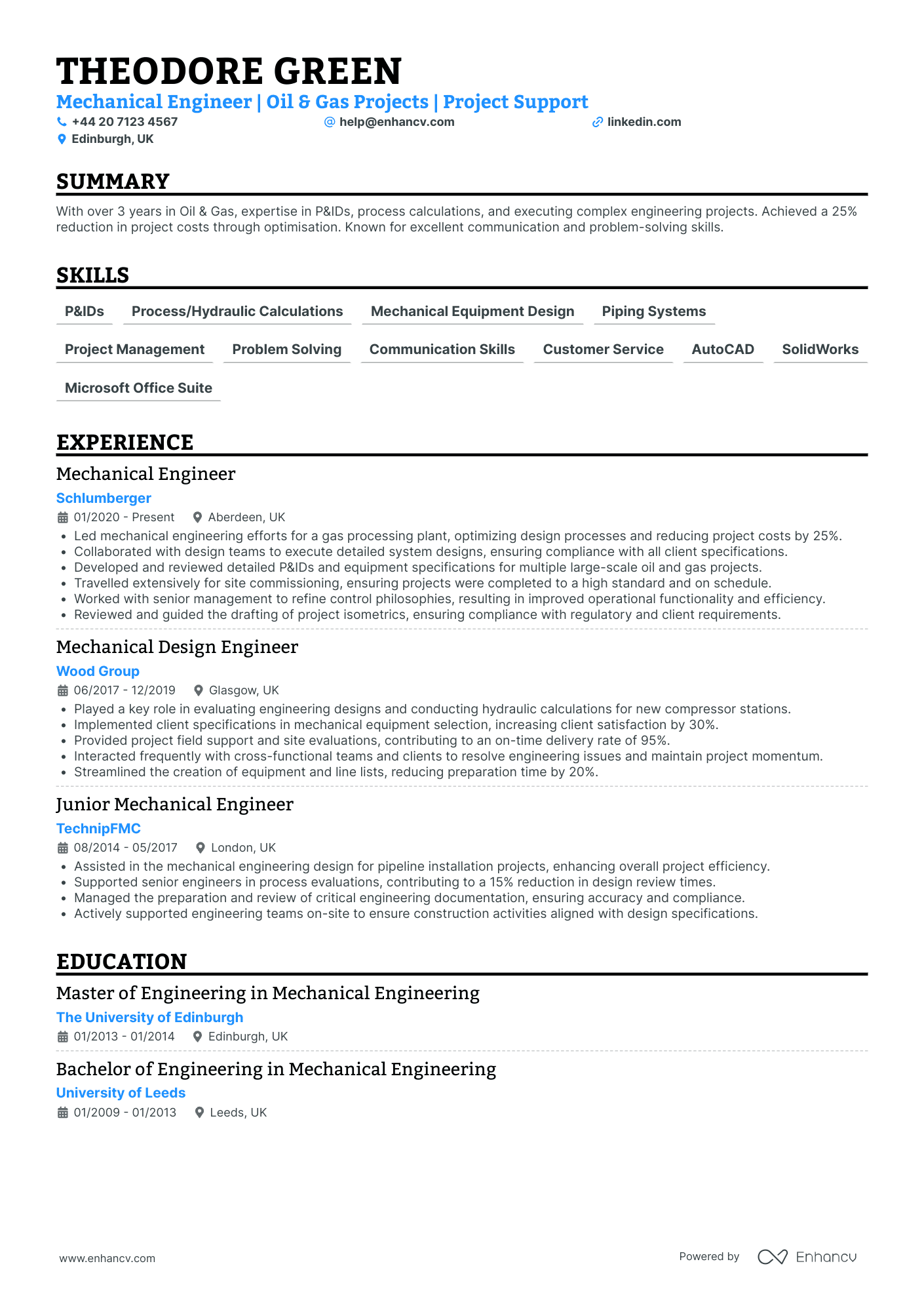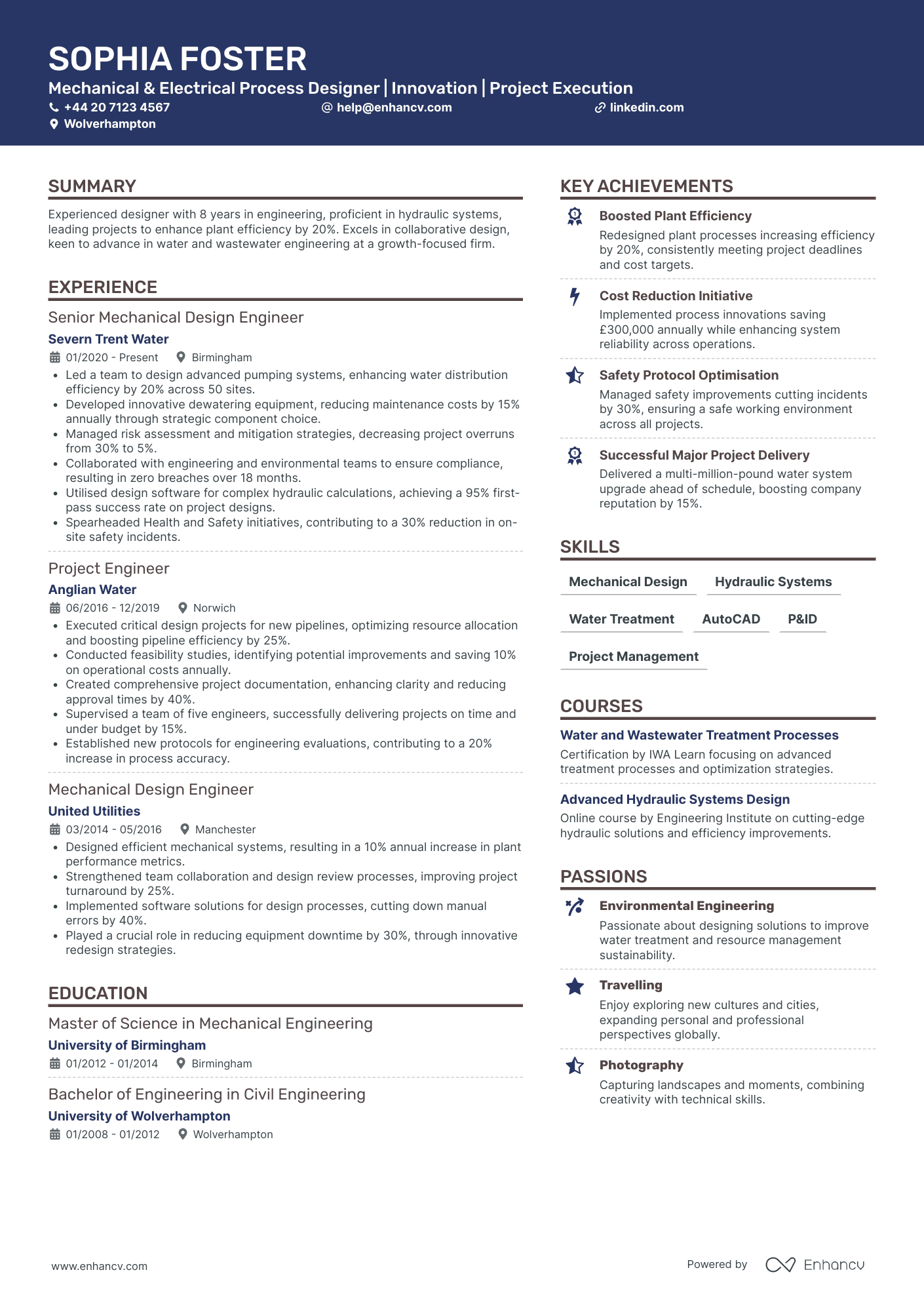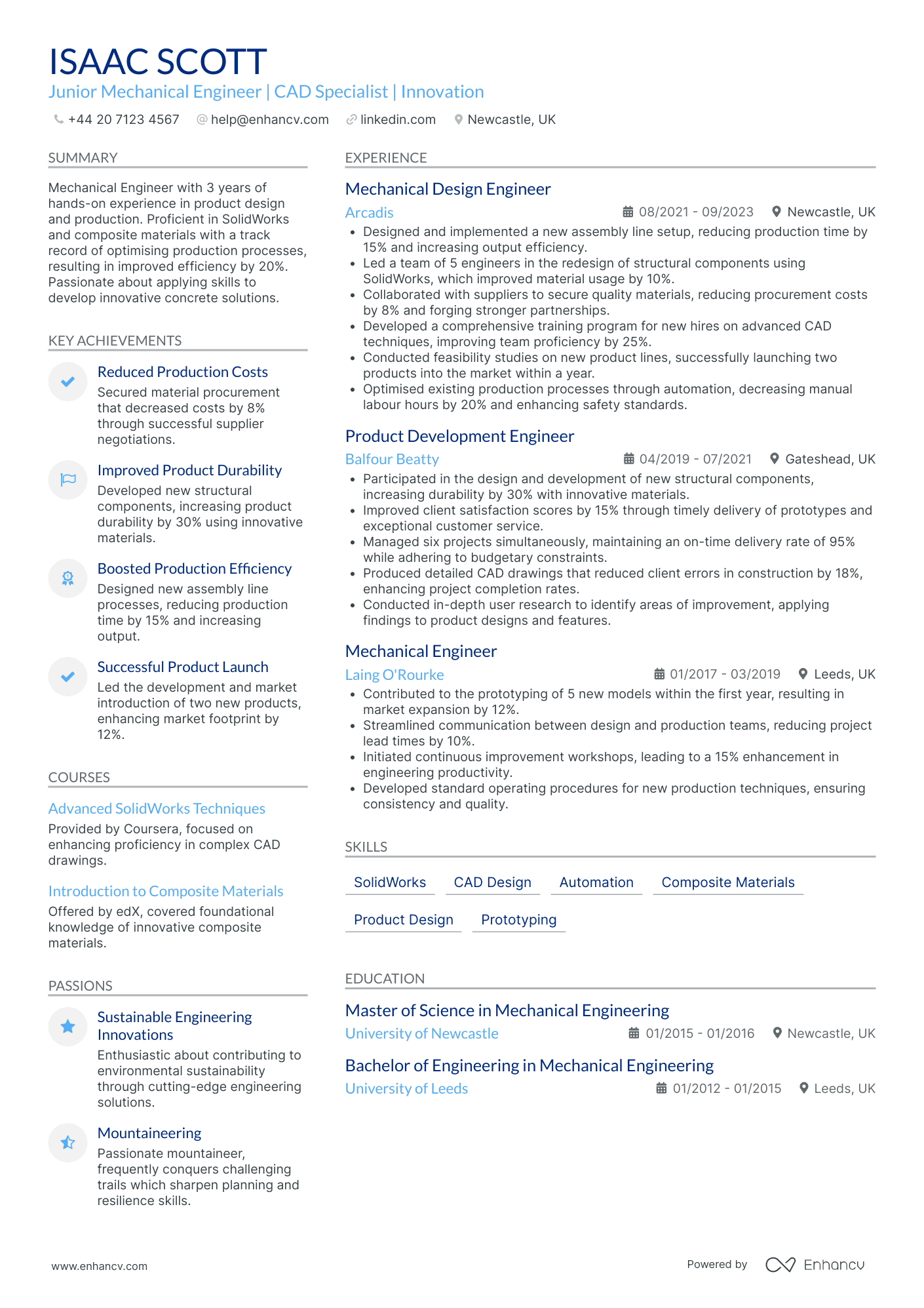One of the specific CV challenges you might encounter as a mechanical design engineer is effectively showcasing complex project experience without overwhelming potential employers. Our guide offers structured methods to distil your vast technical knowledge into concise, high-impact bullet points that capture the interest of industry hiring managers.
- Design and format your professional mechanical design engineer CV;
- Curate your key contact information, skills, and achievements throughout your CV sections;
- Ensure your profile stays competitive by studying other industry-leading mechanical design engineer CVs;
- Create a great CV even if you happen to have less professional experience, or switching fields.
When writing your mechanical design engineer CV, you may need plenty of insights from hiring managers. We have prepared industry-leading advice in the form of our relevant CV guides.
CV examples for mechanical design engineer
By Experience
Senior Mechanical Design Engineer
- Illustrates career progression and industry focus - The CV effectively details the candidate's steady progression from a Junior to Senior Mechanical Design Engineer within significant industry players like Nestlé, GEA Group, and Tetra Pak, showcasing consistent professional growth and deep specialization in the food and beverage sector.
- Showcases organized and clear content presentation - The document is well-structured, dividing sections into clearly defined headings like education, experience, skills, and achievements. This logical arrangement and concise bullet points promote readability and help in quickly identifying key competencies and career highlights.
- Highlights impactful achievements directly linked to business outcomes - The CV not only lists quantitative achievements, such as a 20% increase in production efficiency or £500,000 savings, but also contextualizes these in terms of customer satisfaction, compliance success, and market share growth, illustrating a direct impact on the business health and reputation of employers.
Junior Mechanical Design Engineer
- Career Growth and Industry Focus - The trajectory of Sophia Brooks' career demonstrates a focused growth within the mechanical engineering field, with a clear progression from an intern position to a junior mechanical engineer. Her consistent focus on reduced harm products in the tobacco industry highlights her commitment to improving health impacts through engineering, while also navigating professional roles with increasing responsibility and influence.
- Technical Depth and Industry-Specific Expertise - Sophia’s CV showcases her proficiency in specialized tools and methodologies relevant to mechanical engineering. Her expertise in 3D CAD modeling and product development, as well as her participation in cross-functional collaborations, highlights her technical depth. Additionally, her successful patent application and enhanced testing methodologies speak to her innovative approach within industry-specific contexts.
- Achievements with Quantifiable Impact - The CV effectively captures achievements that have well-defined business implications. For example, Sophia's role in reducing manufacturing costs by 15% and improving design efficiency by 30% demonstrates her ability to drive productivity and innovation. Her achievements are not merely numerical but convey a clear narrative of how her contributions have tangibly benefited organizational goals and user satisfaction.
Lead Mechanical Design Engineer
- Clear structure and detailed presentation - The CV is meticulously structured, offering a concise yet comprehensive view of Alfie Edwards' professional journey. Each section, from the summary to the passions, is distinctly delineated, allowing for easy navigation. This clarity ensures that key details such as his leadership in project management and engineering innovations stand out, providing a quick and effective assessment of his qualifications.
- Notable career trajectory and industry advancement - Alfie Edwards' career trajectory illustrates consistent growth and advancement within the energy sector, evident from his progression from Mechanical Engineer at ExxonMobil to Lead Mechanical Engineer at BP. This highlights not only his technical competence but his ability to lead large-scale projects, adapt to challenging roles, and make significant impacts across high-profile companies in the industry.
- Focus on impactful achievements and safety - Throughout his career, Alfie's achievements are not merely quantitative but have clear business relevance, such as directing a team to deliver a £50M project on time and under budget, and achieving a 15% cost-saving through supplier partnerships. Moreover, his dedication to safety, demonstrated by implementing measures that resulted in zero incidents over a two-year project, emphasizes a comprehensive commitment to safety and efficiency.
Principal Mechanical Design Engineer
- Structured Presentation and Clarity - The CV is meticulously organized, with each section clearly defined and easy to navigate, which aids in understanding the candidate's career journey. The use of concise bullet points under each role allows for quick absorption of essential information, emphasizing significant achievements succinctly.
- Progressive Career Trajectory - Arthur's career demonstrates a clear trajectory of growth, from a Mechanical Design Engineer advancing to a Principal Mechanical Engineer. This progression not only showcases increasing levels of responsibility but also highlights expertise in both NPI and quantum computing, suggesting a commitment to staying at the forefront of technological advancements.
- Industry-Specific Expertise in Quantum Computing - Unique to this CV is the candidate's extensive experience and passion for quantum computing, a field that requires specialized knowledge. Their engagement with quantum systems development and specific courses in this area underscore technical depth, making Arthur a fitting candidate for roles at the intersection of engineering and cutting-edge technology.
By Role
Mechanical Design Engineer in Aerospace
- Clear and Structured Content Presentation - The CV demonstrates exceptional clarity and structure, presenting the candidate's professional journey concisely. It effectively organizes details with headers such as experience, education, skills, and courses, making it easy to navigate and understand Scarlett Murphy's qualifications and accomplishments.
- Dynamic Career Progression - Scarlett's career trajectory showcases significant growth and industry commitment, moving from a Mechanical Design Specialist at Airbus to a Senior Mechanical Design Engineer at BAE Systems. This progression reflects both dedication and capability in handling increasingly complex responsibilities in the aerospace field.
- Technical Proficiency with Industry-Specific Tools - The CV highlights Scarlett's technical depth, particularly in aerospace engineering, with specific mentions of expertise in tools like PTC Creo and methodologies such as ASME Y14.5-1994. These details underscore her capability to apply advanced design techniques in the aerospace sector.
Mechanical Design Engineer in Automotive
- Structured Presentation with Relevant Details - The CV stands out with its well-organized structure, clearly delineating sections such as Experience, Education, and Skills in a logical flow. This clear layout makes it easy for potential employers to quickly grasp Louis Wood’s competencies and career highlights, ensuring that important details aren't overlooked.
- Consistent Career Growth in Niche Fields - Louis Wood’s career trajectory demonstrates a steady progression within the specialized area of mechanical integrity and gas turbines. His roles evolve from Design Engineer at Siemens to Mechanical Integrity Engineer at Rolls-Royce, reflecting an upward movement both in complexity and responsibility within his industry.
- Integration of Cutting-Edge Tools and Techniques - The CV highlights Louis’s expertise in advanced tools such as ABAQUS and ANSYS, and his proficiency in using these for finite element analysis. This not only underscores his technical savvy but also his commitment to staying at the forefront of engineering practices, which is crucial for ongoing innovative contributions to mechanical design and analysis.
Mechanical Design Engineer in Robotics
- Emphasizes adaptive career growth - Chloe Bell's CV skillfully demonstrates a clear trajectory from a Mechanical Engineer at Rolls-Royce to her current senior role at ABB Robotics. The progression highlights her logical career steps, showcasing her increased responsibilities and leadership capabilities, particularly in hardware design and CAD specialization.
- Showcases unique industry expertise - The CV stands out with detailed highlights of industry-specific tools and methodologies such as CAD (Solidworks), 3D printing, and failure mode and effects analysis. This technical depth not only emphasizes her expert proficiency but also underscores her ability to innovate and improve product design and manufacturing processes significantly.
- Highlights leadership and mentorship prowess - Through various roles, Chloe has consistently demonstrated strong leadership skills, evidenced by her achievement in mentoring junior engineers. This has led to a 30% improvement in team productivity, underscoring her capability to lead and elevate team performance effectively.
Mechanical Design Engineer in Manufacturing
- Content Presentation and Structure - The CV is structured to present information clearly and concisely, beginning with a dynamic header and summary that encapsulates Rosie Gray's expertise and career highlights. The use of succinct bullet points under each job experience effectively conveys her accomplishments and responsibilities, allowing for quick assimilation of her professional journey and skills.
- Career Progression and Development - Rosie Gray’s career demonstrates significant growth with a clear trajectory from a Mechanical Engineer to a Manufacturing Engineer. This indicates progressive leadership roles and increasing responsibilities, with her experience spanning esteemed organizations such as Railway Engineering Services, Siemens Mobility, and Network Rail, showcasing her capability to adapt and excel in varying industrial contexts.
- Technical Expertise and Industry-Specific Skills - The CV highlights Rosie's adeptness in industry-specific tools and methodologies like PFMEA and concise 2D/3D drawing creation, underscoring her technical depth in manufacturing and mechanical engineering. Her qualifications are further enhanced with certifications in advanced tooling design and risk assessment, demonstrating her commitment to maintaining and evolving her expertise.
Mechanical Design Engineer in Energy
- Logical Structure and Fluid Clarity - The CV is well-organized, with a seamless flow that clearly articulates Theodore Green's professional journey. Sections are logically arranged to guide the reader through his experiences, educational qualifications, skills, and achievements, thereby maintaining clarity and focus throughout.
- Impressive Career Growth and Expertise - Theodore Green's career trajectory demonstrates notable growth from a Building Services Engineer to a Senior Mechanical Engineer. This progression reflects not only his technical expertise and impact in energy projects but also his ability to assume increasing levels of responsibility.
- Deep Technical Expertise and Cutting-edge Methodologies - The CV stands out through its mention of specific industry methodologies, such as RIBA design stages and LEED certification. These elements underscore his proficiency in sustainable engineering practices, highlighting his commitment to implementing energy-efficient solutions.
Mechanical Design Engineer in Construction
- Structured Presentation - The CV is exceptionally well-structured, offering clarity and convenience. The use of distinct sections such as education, experience, achievements, skills, and courses makes it easy for the reader to navigate through the rich details of the candidate’s professional journey. Each section is concise yet comprehensive, allowing information to be conveyed effectively.
- Notable Career Growth - The candidate's career path demonstrates a clear trajectory of growth and responsibility, transitioning from an Assistant Project Manager to roles with increasing complexity and leadership at Arup and Mott MacDonald. This progression showcases Daniel Baker's ability to adapt and excel in new roles, reflecting dedication and an upward professional journey in the design and construction engineering field.
- Technical Expertise in Engineering Tools - The CV highlights the candidate’s advanced proficiency in industry-specific tools such as AutoCAD and Revit, underscoring technical depth and precision. This expertise, coupled with the ability to implement automated drafting processes, positions Daniel as an innovative engineer who leverages technology to enhance project outcomes.
Mechanical Design Engineer in Defence
- Clarity and Conciseness in Content Presentation - The CV is well-structured with clear sections denoting personal details, experience, education, and skills, which ensures easy readability. Each bullet point under work experience concisely highlights key achievements, focusing on the candidate’s contributions and the outcomes of their work, enabling a quick discernment of their skills and impact.
- Demonstrated Career Growth in Mechanical Engineering - Max Wright's career trajectory is impressive, showing progression from an Assistant Mechanical Engineer to a Mechanical Engineer at renowned companies in a short span. This progression not only reflects their capability of excelling quickly in their field but also highlights their adaptability and readiness for more significant responsibilities in complex projects.
- Integration of Unique Industry-Specific Tools and Techniques - The CV highlights advanced technical proficiencies in tools such as Finite Element Analysis software, Autodesk Revit, and ANSYS. It demonstrates a deep understanding of industry-specific methodologies, emphasizing expertise in sustainable mechanical solutions and energy-efficient systems, which are critical for a Mechanical Engineer focusing on sustainability.
Mechanical Design Engineer in Biomedical
- Career Growth Through Strategic Positions - Henry White's career trajectory is marked by a strategic ascent from a Biomedical Engineer to a Senior Biomedical Data Analyst. This progression illustrates not only his expertise but also his aptitude for leadership and innovation, demonstrating substantial growth within the biomedical engineering and data analytics fields.
- Integration of Advanced Technological Tools - The CV showcases a rich technical depth through Henry’s application and development of advanced biomedical data analytics tools and diagnostic instrumentation. His contributions in upgrading app analytics and improving clinical precision highlight unique industry-specific methodologies that further the impact of technology in healthcare and sports industries.
- Impact Through Achievements - Henry's CV emphasizes achievements that reflect deep business relevance beyond mere numbers. For instance, his enhancement of medical instrumentation efficiency by 45% resulted in improved clinical outcomes, while his leadership in data accuracy projects drove significant advancements in user data management and health service delivery.
Mechanical Design Engineer in Marine
- Strong career progression - Max Wright's career trajectory demonstrates a well-defined growth path, from a Junior Design Engineer to a Senior Detail Design Engineer. This progression illustrates increasing responsibility and leadership capabilities within the engineering domain, signaling a dedication to advancing professionally while acquiring new skills and expertise.
- Technical expertise in industry-specific tools - The utilization of Hexagon S3D, CAD modeling, and 3D design software highlights Max's proficiency with essential tools for naval architecture and engineering. These technical skills are critical for the role, allowing for the creation of precise and accurate technical drawings necessary in marine project execution.
- Focus on high-impact achievements - The CV effectively communicates Max's business relevance through notable achievements, such as reducing design iteration time by 20% and decreasing errors by 30%. These metrics are not only impressive but also demonstrate Max's ability to create cost-saving efficiencies and boost project success rates, which are crucial in delivering impactful results within engineering disciplines.
Mechanical Design Engineer in Rail
- Clear and Organized Presentation - The CV is structured in a way that makes it easy to read and understand, with distinct sections for personal information, career summary, work experience, education, skills, courses, achievements, languages, and passions. Each section is clearly labelled and presents information concisely, allowing the reader to quickly ascertain Ella Bennett's qualifications and accomplishments.
- Demonstrated Career Growth and Expertise - Over a span of 7 years, Ella Bennett has shown significant career progression, from a Mechanical Engineer at Siemens Rail Automation to a Senior Rail Vehicle Mechanical Engineer at Bombardier Transportation. This trajectory highlights her consistent growth within the rail industry and her ability to take on more complex and high-responsibility roles.
- Industry-Specific Technical Proficiency - Throughout the CV, there is a strong emphasis on Ella Bennett's technical expertise in rail vehicle dynamics and mechanical engineering. Her work includes improvements in rail system efficiency and the implementation of new maintenance procedures, showcasing her deep industry knowledge and her capability to contribute to technological advancements in rail infrastructure.
Mechanical Design Engineer in Electronics
- Clear Structure and Conciseness - Isaac Scott's CV is well-organized into clear sections that make it easy to navigate through his qualifications, experience, and skills. Each section uses concise bullet points that highlight key achievements and responsibilities, ensuring that vital information is communicated efficiently without overwhelming the reader.
- Demonstrates Career Progression and Growth - The transition from Electronic Design Engineer to Senior FPGA Design Engineer at different reputable companies outlines a clear progression in his career. Each role highlights increased responsibilities and achievements, indicating his growth in expertise within the field of digital logic design.
- Depth in Industry-Specific Tools and Techniques - The CV showcases Isaac's proficiency in advanced tools like Altera FPGAs and design software such as Altium Designer and Intel Quartus. His involvement in optimizing development processes and integrated design further emphasizes his technical depth and commitment to innovation in FPGA and digital logic design.
Mechanical Design Engineer in Materials
- Structured and cohesive presentation - The CV is structured in a coherent manner, with neatly divided sections highlighting key areas such as experience, education, skills, and achievements. This organization facilitates easy navigation, allowing recruiters to quickly identify relevant information pertinent to the mechanical engineering domain.
- Diverse industry exposure with proven adaptability - Elsie Murray's career trajectory reveals significant growth and adaptability across prestigious companies like Rolls-Royce and BAE Systems. Her transition from a Materials Engineer to a Mechanical Systems Designer showcases a robust growth pattern and skill diversification within the engineering sector.
- Influential achievements with tangible impact - The CV details notable achievements, including a 25% efficiency improvement and leading high-stakes projects. These metrics go beyond numbers to illustrate her business impact, showcasing her capacity to enhance system processes and contribute to strategic corporate goals.
Mechanical Design Engineer in HVAC
- Progressive Career Development - Alice Barnes's career trajectory is marked by steady progress, moving from an HVAC Design Engineer to a Senior HVAC Mechanical Design Engineer. This evolution showcases her upward mobility and increasing responsibilities, emphasizing her adaptability and growing expertise in the industry.
- Strategic Achievements in Energy Efficiency - The CV highlights significant accomplishments in energy efficiency and cost reduction. By leading design innovations that increased energy efficiency by 20% and reduced operational costs by 15%, Alice has demonstrated her ability to drive substantial business impact through technical expertise.
- Integration of Technical Skills with Leadership - Alice's CV reflects a balance of deep technical knowledge in HVAC systems and strong leadership capabilities. This dual proficiency is seen in her successful management of stakeholder communications, training program developments, and maintaining a high client satisfaction rate, positioning her as a versatile leader in mechanical design engineering.
Mechanical Design Engineer in Oil & Gas
- Clear and Structured Presentation - Theodore Green’s CV is distinctively organized with clear headings and concise bullet points, making it easy for readers to quickly locate and digest key information. This clarity ensures that the reader effortlessly navigates through his experience, education, and skills.
- Career Growth and Industry Commitment - The CV showcases a strong career trajectory within the oil and gas industry, beginning as a Junior Mechanical Engineer and progressing to a Mechanical Engineer, demonstrating his dedication and upward mobility within the sector. Each role builds on previous experiences, highlighting his growing responsibilities and technical expertise.
- Technical Depth in Oil & Gas Projects - Green's proficiency with industry-specific tools such as P&IDs and his involvement in complex engineering projects underscore his deep technical knowledge. His efforts in optimizing gas processing plant designs and executing detailed system layouts position him as a specialist in mechanical engineering within the oil and gas industry.
Mechanical Design Engineer in Telecommunications
- Career Trajectory and Industry Growth - Sophia Foster's career path shows a clear progression from Mechanical Design Engineer to Senior Mechanical Design Engineer at Severn Trent Water. This trajectory highlights her ability to take on more responsibilities, demonstrate leadership, and drive efficiency in water and wastewater engineering, reflecting a deep commitment to her field.
- Technical Expertise and Tools - The CV showcases Sophia's proficiency with industry-specific tools such as AutoCAD and P&ID, critical for mechanical and electrical process design. Her experience is further enriched by advanced coursework, which emphasizes her dedication to staying ahead with the latest technological advancements in water treatment and hydraulic systems.
- Concrete Achievements with Industry Impact - Sophia’s accomplishments, such as increasing water distribution efficiency by 20% and saving £300,000 annually through process innovations, provide strong evidence of her impact within the industry. These achievements underscore her ability to implement effective strategies that significantly benefit business operations and contribute to her employer's success.
Mechanical Design Engineer in Agriculture
- Content Presentation Focused on Clarity and Impact - Isaac Scott's CV stands out through its structured and concise format, which clearly presents his career journey and expertise. The use of bullet points under each experience section provides an accessible way to grasp the achievements and responsibilities, ensuring that key accomplishments do not get lost in dense text. Each section flows logically, from his professional experience and educational background to skills and passions, making it easy for the reader to follow his story.
- Demonstrates Career Growth and Increasing Responsibility - The CV illustrates a clear career progression from a Mechanical Engineer at Laing O'Rourke to a Mechanical Design Engineer at Arcadis. This trajectory not only reflects advancement in positions but also an increasing level of responsibility, such as managing project teams and leading product development initiatives. His roles have evolved from contributing member to leader, emphasizing his growth in the engineering field.
- Strategic Application of Industry-Specific Skills and Tools - The CV showcases unique industry-specific elements such as proficiency in SolidWorks, automation techniques, and expertise in composite materials. These technical capabilities are highly relevant for a Junior Mechanical Engineer role, highlighting Isaac Scott's ability to apply specialized knowledge in practical settings, evidenced by his success in process optimization and innovation in product design and production.
How to ensure your profile stands out with your mechanical design engineer CV format
It's sort of a Catch 22. You want your mechanical design engineer CV to stand out amongst a pile of candidate profiles, yet you don't want it to be too over the top that it's unreadable. Where is the perfect balance between your CV format simple, while using it to shift the focus to what matters most. That is - your expertise. When creating your mechanical design engineer CV:
- list your experience in the reverse chronological order - starting with your latest roles;
- include a header with your professional contact information and - optionally - your photograph;
- organise vital and relevant CV sections - e.g. your experience, skills, summary/ objective, education - closer to the top;
- use no more than two pages to illustrate your professional expertise;
- format your information using plenty of white space and standard (2.54 cm) margins, with colours to accent key information.
Once you've completed your information, export your mechanical design engineer CV in PDF, as this format is more likely to stay intact when read by the Applicant Tracker System or the ATS. A few words of advice about the ATS - or the software used to assess your profile:
- Generic fonts, e.g. Arial and Times New Roman, are ATS-compliant, yet many candidates stick with these safe choices. Ensure your CV stands out by using a more modern, and simple, fonts like Lato, Exo 2, Volkhov;
- All serif and sans-serif fonts are ATS-friendly. Avoid the likes of fancy decorative or script typography, as this may render your information to be illegible;
- Both single- and double-column formatted CVs could be assessed by the ATS;
- Integrating simple infographics, icons, and charts across your CV won't hurt your chances during the ATS assessment.

PRO TIP
Incorporate a touch of colour in headers or section breaks, but keep it professional and ensure it doesn’t detract from readability, especially in more conservative industries.

The top sections on a mechanical design engineer CV
- Technical expertise and software proficiency: Exhibits specific mechanical design tools and software mastery.
- Relevant project portfolio: Highlights previous design projects and showcases problem-solving abilities.
- Education and certifications: Details academic background and any relevant industry-specific certifications.
- Professional experience and accomplishments: Outlines work history and key successes pertinent to mechanical design.
- Engineering skills and techniques: Showcases applied engineering methodologies and design skills.

What recruiters value on your CV:
- Highlight your proficiency in CAD software and mechanical design tools as employers look for candidates with strong technical abilities in creating detailed designs and drawings.
- Include any relevant industry-specific certifications, such as Chartered Engineer (CEng) status or professional memberships with institutions like the IMechE, to showcase your commitment to the field.
- Showcase your problem-solving skills by providing examples of complex engineering challenges you've addressed, emphasising your innovative approaches and successful outcomes.
- Detail your experience with product development cycles, from conception to production, to demonstrate your understanding of the various stages of mechanical design and your impact on efficiencies and cost savings.
- Mention any collaborative projects you've been involved with, highlighting your ability to work in multidisciplinary teams and coordinate with other departments like manufacturing and quality assurance.
Recommended reads:
Tips and tricks on writing a job-winning mechanical design engineer CV header
The CV header is the space which most recruiters would be referring most often to, in the beginning and end of your application. That is as the CV header includes your contact details, but also a headline and a professional photo. When writing your CV header:
- Double-check your contact details for spelling errors or if you've missed any digits. Also, ensure you've provided your personal details, and not your current work email or telephone number;
- Include your location in the form of the city and country you live in. If you want to be more detailed, you can list your full address to show proximity to your potential work place;
- Don't include your CV photo, if you're applying for roles in the UK or US, as this may bias initial recruiters' assessments;
- Write a professional headline that either integrates the job title, some relevant industry keywords, or your most noteworthy achievement.
In the next part of our guide, we'll provide you with professional CVs that showcase some of the best practices when it comes to writing your headline.

Examples of good CV headlines for mechanical design engineer:
- Mechanical Design Engineer | MSc in Mechanical Engineering | 3D CAD Modelling | 5 Years’ Experience
- Senior Mechanical Design Engineer | PhD | Project Management | Renewable Energy Systems Specialist | 10+ Years
- Junior Mechanical Design Engineer | BEng Graduate | Proficient in SolidWorks | Enthusiastic Team Collaborator
- Lead Mechanical Design Engineer | Chartered Engineer Status | Expert in Robotics & Automation | 15 Years’ Expertise
- Principal Mechanical Design Engineer | R&D Focus | Advanced Materials Application | Innovative Solutions | 12 Years
- Mechanical Design Engineer | HVAC Design Specialist | Energy Efficiency Expert | CEng | 8 Years in Industry
Opting between a mechanical design engineer CV summary or objective
Within the top one third of your mechanical design engineer CV, you have the opportunity to briefly summarise your best achievements or present your professional goals and dreams. Those two functions are met by either the CV summary or the objective.
- The summary is three-to-five sentences long and should narrate your best successes, while answering key requirements for the role. Select up to three skills which you can feature in your summary. Always aim to present what the actual outcomes were of using your particular skill set. The summary is an excellent choice for more experienced professionals.
- The objective is more focused on showcasing your unique value as a candidate and defining your dreams and ambitions. Think about highlighting how this current opportunity would answer your career vision. Also, about how you could help your potential employers grow. The objective matches the needs of less experienced candidates, who need to prove their skill set and, in particular, their soft skills.
Still not sure about how to write your CV opening statement? Use some best industry examples as inspiration:

CV summaries for a mechanical design engineer job:
- Highly skilled mechanical design engineer with over 9 years of experience in the automotive sector, specialised in developing high-precision components for electric vehicles. Pioneered a patented lightweight chassis design that increased vehicle efficiency by 20%, demonstrating a keen eye for innovation and engineering excellence.
- Dedicated mechanical engineer transitioning from the aerospace industry with 7 years of expertise in fluid dynamics and thermal systems. Successfully led the redesign of a jet engine cooling system, reducing operational temperatures by 15% and significantly enhancing aircraft performance and safety.
- Accomplished materials scientist eager to pivot towards mechanical design engineering, bringing a deep understanding of advanced composite materials and their application in industrial machinery. My research on bio-inspired material structures resulted in a 25% improvement in machine life expectancy across various projects.
- Aspiring mechanical design engineer, motivated to apply my extensive theoretical knowledge from a Masters in Mechanical Engineering at Cambridge University and fresh insights from my recent internship at a renewable energy startup where I assisted in the design of cutting-edge wind turbine technology.
- Experienced mechanical engineer seeking to leverage 10 years of industrial design background into mechanical design engineering, aiming to utilise comprehensive skills in CAD software and a proven track record in project management to efficiently transition and contribute to the new field.
- Driven new graduate with a passion for mechanical engineering seeks to utilise a strong foundation in 3D modelling and simulation gained through academic coursework. Keen to apply my knowledge to practical design challenges while embracing continuous learning and development in a hands-on environment.
Narrating the details of your mechanical design engineer CV experience section
Perhaps you've heard it time and time again, but, how you present your experience is what matters the most. Your CV experience section - that details your work history alongside your accomplishments - is the space to spotlight your unqiue expertise and talents. So, avoid solely listing your responsibilities, but instead:
- adverts' keywords and integrate those in your experience section;
- Use your CV to detail how you've been promoted in the past by including experience in the reverse chronological order.
Before you start writing your mechanical design engineer CV experience section, dive into some industry-leading examples on how to structure your bullets.

Best practices for your CV's work experience section
- Designed complex machine components using CAD software, adhering to industry standards and project requirements, leading to a 15% improvement in manufacturing efficiency.
- Collaborated with cross-functional teams to refine mechanical systems for production, resulting in a 10% reduction in material costs through design optimisations.
- Managed the full lifecycle of product development from concept through to production, ensuring designs met both technical specifications and business objectives.
- Conducted finite element analysis (FEA) on new design concepts to predict structural performance, reducing prototyping costs by 20%.
- Authored comprehensive technical documentation, including design specifications, assembly instructions, and maintenance guides, enhancing user understanding and safety.
- Led a team of junior engineers, providing mentorship and overseeing the quality of their design work, which contributed to a 25% increase in departmental productivity.
- Implemented Lean manufacturing principles in design practices, which minimised waste and standardised components for a more efficient production line.
- Regularly communicated with suppliers to ensure the availability and suitability of materials, negotiating cost-effective solutions without compromising design integrity.
- Stayed abreast of emerging design technologies and industry trends, incorporating innovative solutions that advanced the company's competitive edge.
- Led the design team in developing a new hydraulic system for heavy machinery, improving efficiency by 20% over previous models.
- Conducted multi-physics simulations to optimize thermal management in electric vehicle battery packs, reducing operational temperatures by 15%.
- Published a technical paper on the innovative application of 3D printing for complex machine components which decreased production times by 25%.
- Spearheaded the development of a new air filtration system that increased filter lifespan by 30%, which was subsequently patented.
- Collaborated with cross-functional teams to integrate smart IoT features into legacy mechanical systems, boosting predictive maintenance capabilities.
- Utilized FEA analysis to improve the structural integrity of consumer appliances, ensuring compliance with international durability standards.
- Developed an innovative gear train mechanism for industrial robotics that enhanced load-bearing capacity by 40%.
- Introduced new lightweight materials into the product lineup which cut costs by 15% while maintaining product quality.
- Implemented Lean and 5S methodologies in the design process, leading to a 10% reduction in time to market for new products.
- Improved the design of heat exchangers for marine applications, achieving a 5% increase in heat transfer efficiency.
- Managed a team to redesign an entire product line to meet new EPA emissions standards, successfully avoiding potential penalties.
- Enhanced product longevity by integrating corrosion-resistant materials, significantly reducing warranty claims by 10%.
- Optimized fluid dynamic models for hydraulic systems leading to a 7% reduction in energy consumption.
- Coordinated with supply chain and manufacturing departments to streamline the assembly process, cutting assembly costs by 12%.
- Transformed initial concept sketches into viable product designs for medical diagnostic equipment, resulting in a successful product launch and 100% compliance with FDA regulations.
- Directed design modifications to industrial compressors, elevating machine reliability by 25% in harsh operating conditions.
- Implemented automated design verification protocols, slashing error rates by 20% and ensuring project adherence to stringent aerospace industry specifications.
- Championed a recycling program for metal scraps from the prototyping phase, resulting in a 5% reduction in material waste and a positive environmental impact.
- Designed, simulated, and tested mechanical components for consumer electronic devices, improving drop test durability by 35%.
- Liaised with international fabricators to oversee the production of precision components, ensuring accuracy with tolerances of up to 0.01mm.
- Steered the transition to a new CAD software platform for the engineering team, increasing design productivity by 20%.
- Conceptualized and executed the design of a modular assembly line robot arm, boosting customizability for clients and increasing sales by 15%.
- Oversaw rigorous stress tests for material handling equipment under extreme conditions, verifying that designs met the regulatory safety standards by 100%.
- Reduced production costs by 20% through the innovative redesign of machine components for mass production while maintaining high-quality standards.
- Orchestrated the development of a reliable high-pressure valve system for oil and gas applications, increasing service life by 50%.
- Applied CFD analysis to optimize airflow through HVAC units for commercial buildings, resulting in a 10% improvement in energy efficiency.
- Streamlined the prototyping process by integrating real-time data feedback mechanisms, cutting down prototype development time by 30%.
- Developed a patent-pending suspension system for high-speed trains that improved passenger comfort and reduced vibration noise by 20%.
- Pioneered the use of composite materials for automotive body panels, achieving a 10% reduction in vehicle weight and enhancing fuel economy.
- Coauthored research on mixed-material joints resulting in stronger welds, expanding the company's intellectual property portfolio and setting industry benchmarks.
Lacking professional expertise: how to write your CV to highlight your best talents
Don't count on your lucky stars when you're applying for a role, where you happen to have less (or almost none) professional experience. Recruiters sometimes do hire inexperienced candidates if they're able to present their unique value from the get-go. So, instead of opting for the traditional, CV experience section:
- List any applicable expertise you happen to have - no matter if it's a part-time job, internship, or volunteer work. This would hint to recruiters that your profile is relevant;
- Focus your CV on your transferrable skills or talents you've obtained thanks to your whole life and work experience. In effect, you'll be spotlighting your value as a candidate;
- Separate more space for your applicable academic background and certificates to show you have the technical know-how;
- Ensure that within your objective, you've defined why you'll like the job and how you'll be the perfect match for it. Always ensure you've tailored your CV to individual applications.
Looking for more good examples for your first job? We'll show you how other candidates, with less professional experience, have created their job-winning CVs.
Recommended reads:

PRO TIP
Include examples of how you adapted to new tools, environments, or work cultures, showing your flexibility.
Describing your unique skill set using both hard skills and soft skills
Your mechanical design engineer CV provides you with the perfect opportunity to spotlight your talents, and at the same time - to pass any form of assessment. Focusing on your skill set across different CV sections is the way to go, as this would provide you with an opportunity to quantify your achievements and successes. There's one common, very simple mistake, which candidates tend to make at this stage. Short on time, they tend to hurry and mess up the spelling of some of the key technologies, skills, and keywords. Copy and paste the particular skill directly from the job requirement to your CV to pass the Applicant Tracker System (ATS) assessment. Now, your CV skills are divided into:
- Technical or hard skills, describing your comfort level with technologies (software and hardware). List your aptitude by curating your certifications, on the work success in the experience section, and technical projects. Use the dedicated skills section to provide recruiters with up to twelve technologies, that match the job requirements, and you're capable of using.
- People or soft skills provide you with an excellent background to communicate, work within a team, solve problems. Don't just copy-paste that you're a "leader" or excel at "analysis". Instead, provide tangible metrics that define your success inusing the particular skill within the strengths, achievements, summary/ objective sections.
Top skills for your mechanical design engineer CV:
CAD Modelling (e.g., SolidWorks, AutoCAD, CREO)
Finite Element Analysis (FEA)
Computational Fluid Dynamics (CFD)
Thermodynamics
Material Science
Manufacturing Processes
Mechanical Systems Design
Prototyping and Testing
3D Printing
GD&T (Geometric Dimensioning and Tolerancing)
Problem-Solving
Attention to Detail
Teamwork
Communication Skills
Creativity
Time Management
Project Management
Adaptability
Continuous Learning
Leadership

PRO TIP
Focus on describing skills in the context of the outcomes they’ve helped you achieve, linking them directly to tangible results or successes in your career.
Education and more professional qualifications to include in your mechanical design engineer CV
If you want to showcase to recruiters that you're further qualified for the role, ensure you've included your relevant university diplomas. Within your education section:
- Describe your degree with your university name(-s) and start-graduation dates;
- List any awards you've received, if you deem they would be impressive or are relevant to the industry;
- Include your projects and publications, if you need to further showcase how you've used your technical know-how;
- Avoid listing your A-level marks, as your potential employers care to learn more about your university background.
Apart from your higher education, ensure that you've curated your relevant certificates or courses by listing the:
- name of the certificate or course;
- name of the institution within which you received your training;
- the date(-s) when you obtained your accreditation.
In the next section, discover some of the most relevant certificates for your mechanical design engineer CV:

PRO TIP
If there's a noticeable gap in your skillset for the role you're applying for, mention any steps you're taking to acquire these skills, such as online courses or self-study.
Recommended reads:
Key takeaways
Write your professional mechanical design engineer CV by studying and understanding what the role expectations are. You should next:
- Focus on tailoring your content to answer specific requirements by integrating advert keywords through various CV sections;
- Balance your technical know-how with your personal skills to showcase what the unique value would be of working with you;
- Ensure your CV grammar and spelling (especially of your key information and contact details) is correct;
- Write a CV summary, if your experience is relevant, and an objective, if your career ambitions are more impressive;
- Use active language by including strong, action verbs across your experience, summary/objective, achievements sections.
